#i really loved the structure and how the author chose to tell the story from three points of view
Explore tagged Tumblr posts
Text
Such Things Don't Bear Repeating by Allizane
Summary: A wizard, a wolf, and a boy. Or: spells and magic can never truly substitute for strength. (Harry Potter AU, in triplicate.)
Rating: Explicit
Main Character(s): Derek Hale, Stiles Stilinski, Alan Deaton
Additional Character(s): Scott McCall, Vernon Boyd, Erica Reyes, Ms. Morrell, Bobby Finstock, Lydia Martin, Greenberg, Jackson Whittemore, Danny Mahealani
Pairing(s): Derek Hale/ Stiles Stilinski, Eric Reyes/Vernon Boyd
Tags: Orphan Stiles, Alternate Universe, Magic, Mates, Non-Negotiated D/s Elements, Bondage, Rimming, Past Child Abuse - Physical, POV Multiple, Harry Potter - Freeform, dark!stiles
Words: 25,018
Chapters: 3/3
#this fic will BLOW YOU AWAY#i really loved the structure and how the author chose to tell the story from three points of view#lets just say by the end you won't see what happens coming#sterek#sterek fanfic rec#sterek fanfic#sterek fanfiction#stiles/derek#teenwolffanfictionrecs#sterek rec#sterek recs#sterek fanfic recs#sterek fic recs#sterek fic#derek/stiles#stiles x derek#derek x stiles#author: Allizane#dereks/stiles#derek hale fanfiction#stiles stilinksi fanfiction#ao3 link#ao3 fanfic#fuck jk rowling
2 notes
·
View notes
Text
Thoughts on the Ending (Again): Why This Manga Needs to be Criticized
In short, it's about the author's behavior more than the plot.
This manga leaves me with a very conflicted feeling, and I think it's mostly because I can see why the author chose to write the ending the way they did.
It’s not because the story was poorly written or because the author lacked ability. Quite the opposite, actually.
If I couldn't read just what this author is attempting to do, I don’t think I’d feel this way. If the characters were just pitiful or the plot messy—if I had simply thought, “What a flop”—I wouldn’t have been this emotionally affected.
The author is, in fact, very intelligent. The story is well-structured, and it makes internal sense.
But despite that, I can’t shake the feeling that this ending was deeply inconsiderate toward the readers—and that’s what makes me upset.
I wish I could have walked away thinking, “Well, the ending was what it was, but Ai is so cute—I’ll just buy some character merch.” That would’ve been easier for me.
But I just can’t find anything good to hold onto in terms of this author's intent behind the ending. I wish I could. I tried, for months, but I can’t.
It makes me wonder—did the readers do something to deserve this? Was the author constantly attacked by malicious comments?
While this creator may not always express positive emotions clearly, they often depict negative ones with vivid intensity.
I don’t know much about their previous works, but even from this one, you can tell they breathe life into their characters through dark and heavy emotional tones. As I mentioned elsewhere, their strength as a writer lies in how delicately they handle emotions. And yet, that emotional sharpness seems to be focused on trauma above all. As someone interested in psychology, this stood out to me.
How were their past stories like? Because in this one, almost every character seems to have a tendency to dig themselves into the ground emotionally.
They all act on their own. There’s this sense that nobody communicates, nobody really checks in with each other. They don't come to understand each other. It's like the whole story revolves around that idea, in fact.
Take Aqua for example—right from the beginning, he was taking actions on his own: stopping Ruby’s debut, improvising during filming, recruiting people without telling the agency. In the end, he makes a life-altering decision involving his father without telling anyone, leading to death and destruction.
Akane nearly went after someone with a knife, without telling a soul.
Kana often does things on her own too, like visiting the director, or bluntly saying things to Ruby without any cushioning, even if she meant well.
And Ruby… well, she actually rarely listens to others either.
Is there even one character in this manga who genuinely listens?
Kamiki? Oddly enough, yes—he was probably the most compliant and gentle early on, but after Ai died, he lost all restraint. I think his behavior was driven by desperation.
Ai didn’t listen to others either. If she had, would she have secretly dated Kamiki? Would she have tried to call him, even after having been explicitly told not to? I love that upfront attitude she has, but there's a pattern within not just her, but in every character in this work.
Would she have said “I can’t love you” so suddenly to her lover, and then walked away without giving him time to react or respond?
The characters in this piece just… don’t communicate with each other. That’s something consistently portrayed in this manga. I wonder—was it the same in the author’s previous works? Are there characters who truly open up and form mutual, understanding relationships? Or is it mostly emotional misunderstandings, acting alone, hurtful miscommunications, and constant emotional clean-up? I have a feeling it might be the latter. If that’s the case, maybe that’s just how this author writes.
Characters don’t talk honestly. They decide everything internally, assume how others will react, and if they’re wrong, so be it. They rarely apologize, and things just sort of fade away unresolved.
If they had just spoken honestly with one another, so many conflicts could have been avoided. But instead, situations spiral—again and again. That pattern repeats throughout the story.
The characters are all thoughtful, but they never open up. They remain emotionally closed off, and so they never truly understand one another.
Did Aqua and Ruby understand each other? I don’t think so. They cared about one another, of course—but would Ruby have truly supported Aqua’s choices? Her final words—“my brother opened up my future”—might be partly genuine (maybe more than half, especially considering her symbolic role as Amaterasu), but surely it would have been so much better if Aqua had lived.
If the twins had truly understood Ai, wouldn’t they have at least questioned the man she loved? Before branding him a monster and their mother’s killer, wouldn’t it have made sense to doubt, even just once?
I really don’t think the twins ever understood Ai’s heart. There was no effort to even question whether the person she wanted to protect could’ve really harmed her like that.
It’s so painful.
These characters aren’t mindless—they’re deeply isolated. They don’t open up, they don’t communicate sincerely. There’s a lack of honesty between them.
In fact, I believe the pair who understood each other best in this work was Ai and Kamiki. That whole internal dialogue about him going 'we were the same, we understood each other, Ai loved me.' That's actually what's very true and it's the truth about their relationship. Which is good for Ai because she did indeed find someone who was this much attached and caring about her and they shared a very strong mutual bond. I'm serious.
Remember the scene where Kamiki recalls them smiling together? How he pictures them smling together right before his death? Ai really did smile a lot around him. She smiles when she pictures him in her head.
And Kamiki’s understanding of Ai is probably the most accurate portrayal of her in the entire series. He did love her—and he already knew things about her that others spent the whole series trying to figure out.
Given how much guilt, self-loathing, and shame he carries, he would’ve never imagined them being happy together if she really never loved or cared for him. This guy is displaying immense self-hatred; he would not be able to imagine her being happy around him if he weren't convinced she'd be happy with him.
What's going on is that he adored her—so much that her death completely broke him. He blames himself and lied he's the the one who's killed her because he tried sending flowers instead of going himself, and then the tragedy struck. There’s no sign he ever harbored resentment. His feelings seem rooted in longing and regret. He's in despair and is miserable regarding what happened, that event totally tore him apart so he could not live a normal life after that.
Even from a meta perspective—if this manga were only about “a celebrity who was murdered by a crazy ex,” that would be such a shallow conclusion. That’s not what this story is truly about.
Kamiki was just incredibly unlucky, and unfortunately had a tendency to blame himself for everything. If this were just a revenge story, it would be lacking in depth. It clearly aims to explore more.
I’ve analyzed the “truth” of the incident over and over, so I won’t dwell on it here.
What I want to say is this: I’m starting to wonder if this author simply doesn’t have much faith in people.
Maybe they have this tendency to want to carry everything on their own. But it’s more than that—the way they tell stories feels like it’s coming from a place of low expectations. They don't expect their readers to understand their own story. And yet, they’re writing to an audience.
So then why write this way?
It feels like they’re saying: “I’ve done my part. Whether you understand or not isn’t my concern.” But at the same time, I sense they still feel hurt. I don’t think they’re particularly emotionally resilient. Their characters all pretend to be strong, but inside, they’re struggling deeply. There’s not a single emotionally stable character in this manga except for the ones used for laughs.
Having one character like that would be good writing—but when everyone shares that emotional blueprint, it feels less like storytelling and more like a worldview. Maybe the author really believes people are just like that.
And beyond that… I sense something a bit darker. I hope I’m wrong—I really do. But I can’t shake the feeling.
That’s why I can’t make sense of the story’s purpose—or the decision to turn it into an anime. If that perspective gets reproduced through adaptation, it’s even more troubling.
Maybe most readers don’t think this deeply, so I ask myself: am I being overly sensitive?
If the author had faith that readers would understand what they were trying to say, I think they would’ve structured the story differently. But I get the impression that they don’t really trust—or even like—their readers.
The storytelling is entirely one-directional. There’s no sense of “I believe someone out there will get it.” It’s more like: “I’ll say what I want. The rest is up to you.” But this wasn’t a purely personal story—it dealt with real social issues, things that echo real tragedies and real victims. I think that comes with a responsibility to approach it differently.
But the author’s main theme seems to be: “People can’t understand one another.” And that’s where it stops. There’s no next step like, “So let’s be kinder” or “What if we tried a little more tenderness?” Just: “People don’t care about the truth.” And everything gets buried under that.
If this had been a personal essay manga, I wouldn’t have minded. But it wasn’t. It brought in much more.
So when I say it feels like they don’t care for their readers—I don’t mean that as an insult. I just wonder if that belief—that “people don’t understand anyway”—is the underlying mindset.
The story ends with the creator walking away, leaving readers stunned, then turning around and saying, “Well, they wouldn’t get it anyway.”
That’s the impression I got.
It’s a very distancing way to tell a story. There were so many ways this manga could’ve been more empathetic, more generous. But it deliberately chose to keep readers lost in the fog. That feels like abandoning the very readers who cared. If you truly believe someone might understand your intent, you offer clarity—at least at the end. You explain your intent and what's really been happening. But that never came. And I think that was also intentional. There is something that can be achieved with a setup like this, but I don't sense anything kind about it. In fact, I'd say it feels like it's a setup to reinforce the author's own idea about the public. That's not the way to go when you're dealing with a subject matter as important and heavy as this one.
To me, it seems the author wanted to highlight society’s apathy—but instead of confronting it head-on, they did so indirectly, in a way that feels passive-aggressive. The message gets muddled. It’s hard to spot at first—but once you do, it leaves a bitter taste.
I just don’t understand why there’s this much hostility toward the readers. I've never seen a work that does it with this intensity.
Even if I don’t agree with their view, it’s not completely baseless. But why not say it clearly—and accept the response? Actually, it feels like they knew exactly what would happen. By obscuring it, they get to quietly judge others without being judged in return, without being caught on their act.
They find comfort from that distance. And stay safe.
But when your story tackles social issues—that’s not good enough.
This attitude of this writer really upset me. They're so irresponsible.
There’s a lot that made me upset.
This manga could have gone so much further. The author could’ve brought us along—but instead, they actively prevented that from happening.
I can’t even tell if they wanted to be understood or not.
Because their message seems to be: “The public is cruel, unkind, ignorant, careless, and always ready to judge.”
Then maybe that was the point—leaving behind whoever doesn’t “get it.”
But if you leave it like that, the issues aren't properly addressed. The characters are left pitiful. There were clues, yes—but the tone is too cold, too cynical.
I think this view may have sprout from a strong internal belief or an emotional wound. Maybe it’s not entirely random, because a thought like this don't just naturally sprout from somewhere. Maybe something hurt them deeply. And maybe that’s why it's hard to ignore.
But this creator—given their platform and the scale of this 16-volume story—used real-world issues to tell a story that… ultimately says just this?
That’s what frustrates me most. Do they even care about what they're tackling on?
To me, the perspective of this manga feels—frankly—irresponsible and emotionally immature. (Of course, I could be wrong. Maybe it wasn’t meant that way.)
But I feel like this pattern will repeat. Like there’s some unresolved inner belief the author keeps affirming with each new story.
And because they’re good at structure—they’ll probably create another attention-grabbing work. But I worry it’ll be like this again. Personally, I won’t read this author's next work or the ones after that.
It’s just… this work gained a lot of popularity. It earned a lot. Received a lot of love.
Does the author not like people, even a little, even after having received such affection?
Do they really think this low of their readers?
Even if the author doesn’t personally believe that, the story itself seems to operate from that belief—and I can’t support that. If they had something to say, I wish they had just said it. That would have made the critique clearer, at least.
But this feels like wanting to criticize without ever being criticized in return.
They say, “This is fiction”—but that can’t be used as a shield. You can’t pass judgment on others and then hide behind the idea that everything was "fiction" when it’s your turn to answer.
You can’t deny people the chance to understand, and then blame them for not getting it.
Maybe the author is afraid. I understand that can happen. But this level of emotional unavailability is just too much. The work feels overwhelmingly closed off.
Ai tried, you know? She tried to show herself, to be open. But then she was killed off by the author themselves—and the story blames the world for not understanding her(or Kamiki's truth).
But isn’t it the author who denied the public within the story, and us, as readers a chance to understand them properly?
They made up their minds from the start—“people won’t care anyway”—and left no room for anything else.
That’s not fair. And for those of us who did try to understand, it feels like being turned away at the door.
And now, there’s going to be an anime?
I don’t know… Maybe I’d feel differently if the story had clearly said what it wanted to say. But this just feels like too much.
And I don’t think I can bear seeing this kind of story repeat again.
Maybe I’m being selfish for saying so. For not wanting this work to get expanded or spread any further than it is now.
But I truly don’t want to be angry anymore.
If the author really believes no one understands just what they've been doing, I want to say they're wrong. They're the ones who did not do their part to communicate. There were audiences open with all ears, who gave their hearts, yet they're the ones who never gave them a chance. This is no way to treat people or view the world.
#oshi no ko#oshi no ko spoilers#oshi no theories#hikaai#This work does not deserve an anime or fans who love it honestly#spoilers#it's incredibly hostile towards the audience it's being loved by#I'd feel better if I can't spot that out#what happened to this writer honestly?? were they always this way?
18 notes
·
View notes
Text
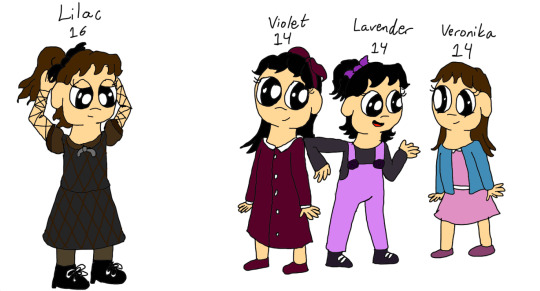
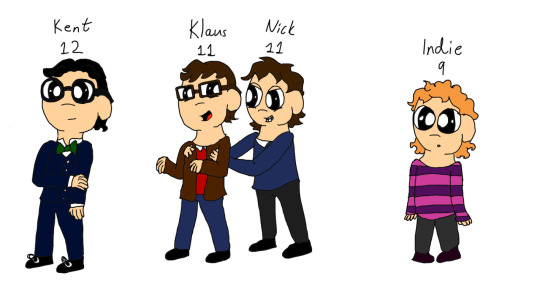
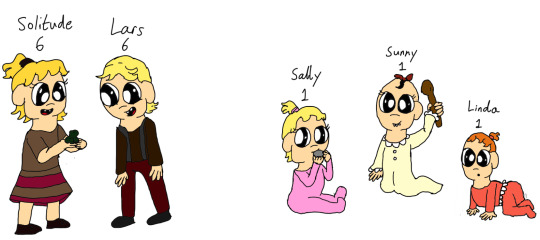
So we had a lot of "multiply the Baudelaires" pitches again recently so I thought it would be fun to pitch it. I did a 13 Baudelaires AU pitch (meaning there would be one extra that wouldn't fit into a Violet-Klaus-Sunny category). I even decided to draw some "childhood memories" but I only got to Klaus and Nick's birth.
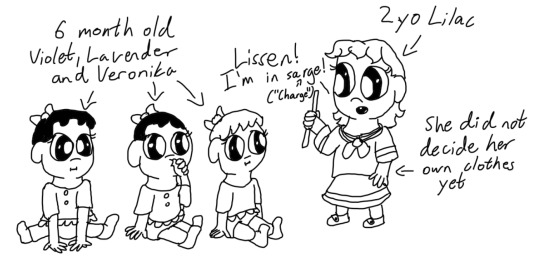
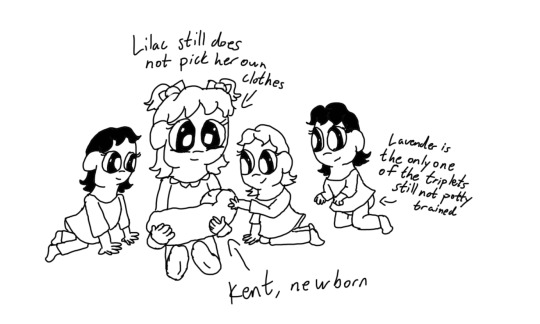
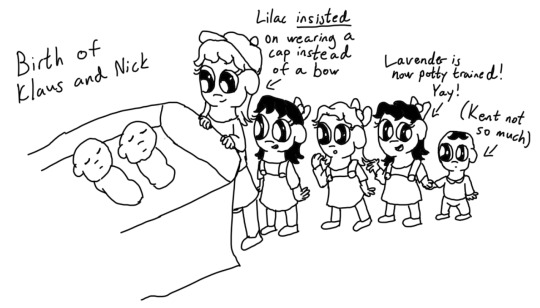
Ok, so let's introduce all the names and perhaps some character introduction. I pitched this in my head like yesterday, so... if I ever DID write anything about this, lots could change.
I also want to say, IF I'd end up writing this, then it wouldn't be a full asoue au. I think 13 is that magic number where VFD decides it's not worth burning down a house, and so the kids grow up in peace. So, the AU would then be them having chaotic sibling adventures - maybe 13 chapters where every sibling gets their own chapter.
Now, the names and character introductions under the cut!
Lilac - I wanted to try being more original but tbh after Connie’s fic, it was just set in stone that she IS Lilac and it feels weird to call her something else. As the oldest she wants to be the one in control, but especially her 2 year younger (actually 1 year and 10 months younger but practically 2) sisters try to share the responsibility with her. She doesn’t really want them to do that because she wants to be in charge, but then she complains about getting no help. So like, she’s never really satisfied 😆 Oh well. Lilac loves inventing and has created tons of gadgets over the years that both has helped around the house but also has entertained herself and everyone around her. She’s a lesbian, but does not know it yet.
Violet - Oldest of the first set of triplets. She really looks up to her big sister and as a kid she wanted to copy everything she did in hopes of becoming like her. But she is the closest to her triplet sisters. The three seem so well behaved, but if they’re quiet, you know that mischief is brewing… Violet is a mechanic, and likes to fix both broken machines and vehicles. But she especially likes to fix Lilac’s inventions that broke (many times hoping to get her approval by doing it). She is bisexual.
Lavender - As you can notice from the illustration, she is not really a Violet from the book or any adaptation. She’s more an ”original” design Violet I guess. Lavender is an illustrator, and you will rarely see her without pen and pencil. She illustrates everything from architectural structures to her surroundings, to even using her skills to make silly comics. Sometimes she also uses it to draw a plan for her and her sister’s upcoming mischief… She is pansexual.
Veronika - I contemplated a long if I wanted to spell it with a C or a K, and I chose K because it just felt fun for once. She is an architect, who already has constructed a treehouse in their garden and a playhouse for the younger kids. It’s not always she uses manuals either, it kind of sits in her head how everything is gonna be. She is bisexual.
Kent - Despite being the 5th kid and thus one of the older ones, Kent is very babied by his older sisters. Sure, they baby all their younger siblings, but specifically him for some reason. Nonetheless, he loves the affection he gets from them, even if it means he doesn’t really get as authorative to his younger siblings. Kent is a writer, always having new ideas for stories. He loves telling them for anyone who will listen and is often picked to put the youngest kids to bed by telling them a bedtime story. He is asexual.
Klaus - The older of the twins, even if Nick does not want to treat it as if it’s like that. Also, yeah, it’s hard not to make Klaus and Nick twins… either way! Klaus is the family researcher, and now seems to know facts about practically everything you can think of. Both very important facts and very useless facts. But both can be valuable! He is gay.
Nick - Often called a troublemaker. What is he supposed to say? Sometimes it’s boring to just sit still and do what you’re told. Especially if someone messes with his siblings. Only HE can do that. Nick is the family explorer. As a kid he explored every corner of the house, as well as the whole garden. If he’s not in the room, he has probably wandered off to one of his many hiding places. He has only told a handful of his siblings about the trapdoor in the living room… Nick is asexual.
Indie - The Baudelaire that is not based on any canon sibling. Indie is just… Indie. They don’t talk much - not because they can’t, but because they like to observe more than speak. Many of their siblings have called them the family spy. They’re great at spying on people without getting caught, and they won’t tell anyone either unless asked to. Practically all of their siblings have come to them in private to ask about what they’ve heard about another sibling, and Indie has not promised to be silent about that. But maybe it could have stopped a few fights to keep their mouth shut. Indie has also from an early age neither felt much like a ”girl” nor a ”boy”. Having gotten lots of hand me downs, they love wearing their sister’s old sweater even if it’s too big for them, and their brother’s old shoes, even if they’re very run down.
Solitude - I liked to make one of the Sunnies older than normal, and thus Solitude is 6. She loves to collect animals, and has a full collection of bugs, amphibians and worms. Everyone has a name too, and she’ll be very mad if you just refer to them by their species. That’s not a ladybug, that is Lady Oscar! Solitude knows that her animal friends likes it the best outside, so her collection is tiny houses she has built for them (with the help of her big sister Veronica), but she visits every day to talk to them.
Lars - Just like I wanted an older Sunny, I wanted a younger-than-normal Klaus. So, here’s Lars. He’s a bit of a mix of the luckiest kids in the world-kid, but also I felt like I needed to make one of the brothers blonde. Lars is hyped about everything around him. His twin sister’s bugs and frogs, Kent’s stories or Lavender’s comics… he’s constantly entertained! And he wants to entertain people himself! You’ll often see him practice a performance to an invisible audience, or to his younger sisters who gladly will watch him. Lars does it all - singing, circus tricks, magic… he wants to also try a puppet show, he just needs to learn how to do that…
Sally - When I am saying she and her sisters are 1 year olds, it’s very different depending on how many months they are. But I’d say they JUST turned 1, so they’re 12 months old. Sally loves to bite! She has very sharp teeth and it’s not uncommon seeing her bite on a rock. One time she bit a rock so much it became super smooth! Otherwise, Sally is a pretty normal baby who tries her hardest to learn to walk. Her sister Sunny already knows how, and that has made her incredibly jealous!
Sunny - Just turned 1 and is already the family chef! Sunny showed an interest for cooking as soon as she learned to grip onto things, and while she can’t be trusted alone with cutlery just yet, she has definitely been a help in the kitchen to make the meals more tasty.
Linda - The name is directly from ”Lil’ Linda” from The luckiest kids in the world, but I changed the design a bit. Linda is the most ”normal” baby, in the sense that she doesn’t aspire to much just yet. She often converses in baby talk with her triplet sisters, and while it was fun when they were younger, her sisters have started to show an interest in learning the words of the older people. Linda is not interested to converse with the older people. Nor is she interested in walking, and doesn’t get why Sally seems to eager to do it now when Sunny can. Linda just wants to be a baby forever. Crawl around, receiving cuddles and kisses… getting to sleep whenever and wherever you want… getting to use the bathroom whenever you want… why does everyone seem to want to grow up? Why is everything changing so fast?
Ok, that was a lot! It is very addicting to just pitch ”multiply the asoue siblings” AUs. Maybe I can pitch a 12 Quagmires AU next or something. Even if I never actually write anything, it’s so fun just to pitch it.
7 notes
·
View notes
Text
[Marauders rant moment]
I hate the way this Fandom treats <young> Peter Pettigrew. It's so insufferable.
I absolutely live laugh love the boys, and i survive on the dopamine this Fandom gives me, but let's be real here, the marauders were just a bunch of insufferable popular teenage boys who spent their days causing chaos and were kind of these 'elite' students. If they were real and they had been with any of us in school, we would honestly just be so done with them and roll our eyes whenever they're braught up.
Peter was the black sheep of the group, ironically enough. He was the quiet one of a very loud bunch. And if the marauders were constantly erupting fireworks, Peter was nothing but the little 'pshhht' sound after the boom. He was not as attractive as they were, granted that James, remus and Sirius are portrayed as greek gods. He was not fit for the 'beauty standards' (im not gonna get into the fact that the Fandom collectively agreed to make him like this when they could've possibly, like they did many others, just alter his looks and make him more conventionally good looking, at the end of the day this fandom's main structure is perspective).
He and remus do share the same 'quiet kid' aspect, but whereas remus was given a background story and a tragic personality, Peter is always painted in a very one-dimensional way. In every single fanfic, he is either the bad guy, the homophobic guy, or just a background nuance.
Thing is, we could easily change that as a Fandom that does not have the word 'canon' in their dictionary, however we always chose to villanize him. And don't get me wrong, Peter does canonically become the villain, but no one is born bad. Villains are made by so many altering factors in their life.
All the other marauders got to date one of the girls at some point more or less (and depending on the fics) like the very popular sirius-Mary thing, obviously james-lily and sometimes even Remus-Marlene / past remus-lily. But no one ever gave Peter a second glance. Authors always 'invent' him girlfriends and OCs to date if they were kind enough to give him any sort of storyline at all.
Peter became a villain, yes, but he was once an innocent kid as any. He had a bright future ahead of him. He may have had hopes and dreams and secret crushes, and I hate to see that no one ever takes a second to consider it.
Peter is always faulted in fics for wanting a normal life. A normal job, a normal house in a normal place with a normal middle class life. He never was for all that explosive chaos. And everyone shamed him for it. Because sirius is a runaway with abusive parents, a very dark past and a rebellious soul, remus is a werewolf is a tragic past, no parents and absolutely nothing to lose, and James is a sunshine with a beautiful home life but a secretly crippling self esteem. Peter was just a simple boy from a simple household and trust me I couldn't tell you more because I wouldn't know. Nothing about him is clear. He's just always portrayed as a villain to be but this shouldn't be some kind of bridal shower. This is a boy who just wanted to be loved.
Maybe it's my savior complex talking, or the stick-up-for-the-underdog mentality I've got, but Peter deserved so much better than this.
There's this one fic (I didn't read it when I saw the 'petter Pettigrew is a bad person' tag) but the name really put me into perspective for a second. It's called ''the sun, the stars, the moon, and Peter''. How crushed i was when I read it.
I've always been a Pete apologist (not apologist for what he did, but more of an apologist for the person he was before he wasn't anymore.) And it just destroyed me.
In this fic there is a quote (i saw it in a tt video)
''James was always described as the sun, sirius was the stars, Remus was the moon. Where does that leave peter? He is like the meteors. Not important, but he can destroy all of them if he wants.'' CHILLS.
Tell me why do you think the betrayal hurt that much? Was it because Peter was just a background character in their lives or because he TRULY MEANT SOMETHING. to ALL of them?!?!?
Start thinking from this pov, and then build your fics, draw your fanarts (AND PLS INCLUDE HIM) and do whatever else you want.
Justice for Peter Pettigrew. He's human too.
[Edited]: I would like to make it clear that this isn't about Peter *in the marauders universe*. It's about how the fans portrait him. I'm only talking about the way authors of fics make him so one dimensional and give him no depth or plot line, and the way he is treated as a character.
I changed some of the things I've said in the rant, because someone did make me aware that i had offended them with what is said, and i sincerely hope this doesn't happen again.
#harry potter marauders#marauder fandom#james potter#sirius black#remus lupin#peter pettigrew#PETER PETTIGREW!!!!!#justice for peter#i hate when this fandom does things like this#rant#angry rant#im fuming#its so not fair#like please look at him he's just a baby he loved his friends and only ever wished to be as bright.#so done.
6 notes
·
View notes
Text
Crossings
Written by Katy S. Duffield
Illustrated by Mike Orodan
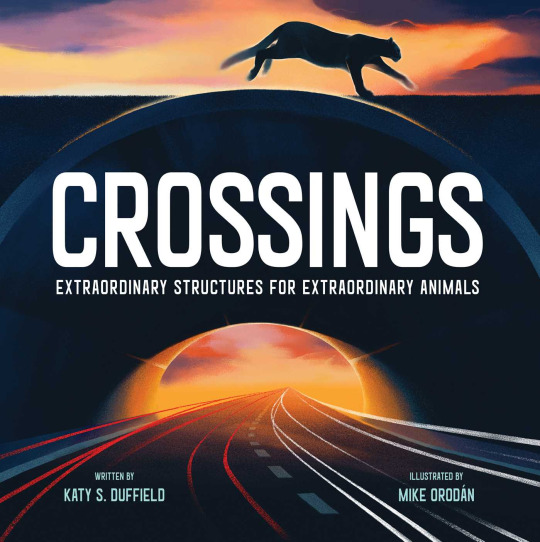
Genre or category
Informational
Target Age Group
4-8 years; Pre-K-3rd
Summary
Crossings tells the stories of man made structures that solve the problems of animal travel in urbanized areas
Justification
I first saw this book at a library conference during a session highlighting stand out books published in Arkansas. Immediately I wanted to read it not only for its interesting premise and beautiful pictures, but the educational possibilities that could be built on it. For a year I taught STEM to elementary students and this book really hit that part of me. Students would love to solve this real life problem while teachers will appreciate the practice of the engineering design process. Early Childhood teachers can use this book to help students under positional words and older elementary teachers can use it to highlight the importance of prepositions. Most importantly, this book draws in readers because it is relatable. Most readers will have some experience with the problems of animals crossing busy roads and this book offers a unique perspective on how humans can fix it.
Evaluation
For this review, I will be evaluating the repetitious language, accuracy and detail, and the choice to use illustrations instead of photos.
Language
Crossings is of interest to a wide range of ages due to its universally loved subject matter. Author Katy Duffield helps to make this book accessible to younger audiences by introducing a pattern in her prose. Early on she establishes the repetition of “Over, under, across, through” (Duffield, 2020, p.1). Then she continues this pattern by introducing structures that go over, under, across, and through in that order while highlighting the preposition used. This pattern repeats through the 12 structures that she shows. This predictability helps to engage younger readers by giving them a structure they can rely on. Young readers will know what to expect from each section of the book and can focus their energy on enjoying the story. It also allows them to feel participatory in telling of the story as they accurately predict what comes next. In doing this, Duffield makes Crossings an information book that even the youngest of readers can follow and enjoy.
Accuracy and Detail
Crossings is classed as a non-fiction book, therefore it is important that all the information in the book is accurately and clearly given. What is impressive about Crossings is that Duffield maintains her accuracy and satisfying level of detail while considering both her younger and older audiences. For younger readers, Duffield provides accuracy, though slightly vague information about each structure– “Black bear cubs follow mama UNDER a Montana highway” (p.30). Pre-K readers will get the gist of the information in a quick and predictable format. For older readers, Duffield includes more detailed explanations of the structures to give a more accurate picture of the what, where, and why and how’s of each structure. These extra facts are presented on the same page as the simpler prose as a supplement. Duffield also includes facts in the back of her book and information for further reading for readers as old as middle school and high school.
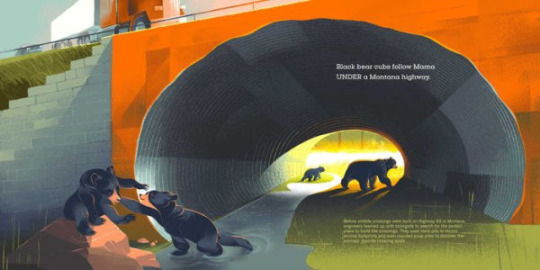
(an example of both the simpler and more detailed text)
Illustrations
When creating a nonfiction picture book there comes the choice to decide how to present the pictures– as photos or illustrations. Crossings chose to use colored pencil drawing done by illustrator Mike Orodan. This choice makes the book a more interesting and dynamic read. While there are photos of each featured structure available, action shots of animals using these structures are harder to come by in some instances. The salamander passages in North Amherst are too small and dark to photograph in an exciting way. Orodan solves this problem by illustrating the structures instead, allowing him to capture scenes that would be unavailable to a camera. Readers get to experience close up pictures of the structures as they are being used by the animals from angles that would not otherwise be possible. The illustration better allows readers to understand how each structure functions as they see pictures of animals using it in various ways and stages. The illustrations also shift the perspective of the image to the viewpoint of the animals involved. This creates the illusion of readers getting to use the structures with the animals. Orodan��s work is what elevates this nonfiction book past solely informational and into entertaining.

References
Duffield, K.S. (2020). Crossings (M. Orodan, Illus.). Beach Lane Books.
0 notes
Text

Anyone who knows me knows that The Singing Hills Cycle has been one of my favorite fantasy series of all time. As someone who has to read a lot for work, I often read novellas in my free time. Very few novella authors are able to capture complex worldbuilding, theming, and characterization as well as Nghi Vo. Vo creates complete, impactful stories every single time. So, naturally, I was super pumped when Mammoths at the Gates was added to my library’s collection.Mammoths at the Gates is a story centering on the value of storytelling, grief, and the complexities of human nature. After many years traveling, Cleric Chih finally returns to their beloved Singing Hills Abbey–only to find that their mentor, the great Cleric Thien, has passed away, and that their granddaughters are trying to pressure the Abbey into surrendering their body. These women ride impressive mammoths and threaten to destroy the entire Abbey if they don’t get what they want. However, their aspirations for Thien’s body go against the life and identity their grandfather chose, leading to conflict with the clerics of Singing Hills.
I appreciated the way Vo weaved the narrative around Cleric Thien and how she incorporated that characterization through the tale-telling structure of the Singing Hills Cycle. Considering the Abbeys expertise, it felt natural that they would have a grieving ritual centered around the living discussing stories of their deceased. As each character told their stories, reflecting on the version of Thien that they knew, I really felt the gravity of their death and the complicated life they led. The tension between the granddaughter’s wanting to honor their grandfather (in their own way) and their anger at them for abandoning the wife they once physically abused felt messy and genuine and poignant.
Like always, Vo includes interesting commentary on colonialization and the importance of record-keeping. All of the characters, be they old or new, are given their opportunity to shine and develop. While Chih usually is secondary to the narratives they are transcribing, they really stood out in this volume. Vo really flexed her writing skills as Chih struggled to contend with the changes in their life and the realization that all things must pass. Additionally, I loved seeing Almost Brilliant again and learning more about her people’s culture. The connection between Thien and Myriad Virtues was emotional throughout. And that ending! I teared up so many times when reading this.
Out of all the books in the series, Mammoths at the Gates is probably the one I would recommend to newcomers to the series. It highlights all of the series’ greatest strengths and the complex relationships between the characters are likely to connect to readers who might not typically read books from this genre.
1 note
·
View note
Note
As a writer for this comic, scripts for videos, or what have you, have you found writing ever gets easier? Like with visual art you can study references or practice and eventually see results but just throwing more words on a page doesn't feel like it has the same tangible improvements. There are clearly authors out there who can certainly fill pages and either could not or chose not to improve things my favorite examples being from "men writing women". So yeah part of it is knowing what not to write I guess, but is there a way of seeing writing improvement you know of?
I think it's certainly harder to see, but writing absolutely does get easier with practice. Like most art forms, it's a matter of figuring out how to translate what's in your head into a tangible thing on the page. That can be very difficult and counter-intuitive. For instance, because I think of storytelling in a very visual way, my first instinct on prose writing is to describe everything in terms of visual detail, but the problem is, this does not actually work in writing.
The greatest strength of prose writing is thoughts and feelings - to communicate exactly what is going on in a person's head, and to inspire the audience to internally craft an image that matches the feeling the story is communicating. This is something no other art form can communicate so readily, because every visual art form is on a certain level on the outside looking in at the characters. And frankly prose writing is not very well-equipped for detail-oriented visual description. If you try, you often end up with something that doesn't really paint the sort of word picture you might be looking for.
"I’m a goth (in case you couldn’t tell) and I wear mostly black. I love Hot Topic and I buy all my clothes from there. For example today I was wearing a black corset with matching lace around it and a black leather miniskirt, pink fishnets and black combat boots. I was wearing black lipstick, white foundation, black eyeliner and red eye shadow."
(from My Immortal, natch)
This, detail by detail, is very clear about what the character is wearing, except if you read it you have to mentally arrange all the pieces yourself. Black corset, okay. Black leather miniskirt - really? Okay. Pink fishnets - cool. Black combat boots, all right, great, that's the clothes done. Oh god there's more-
But the exact specifics of what this character is wearing really don't matter, do they? It matters more the feeling they're inspiring by their appearance - what their appearance communicates to the audience, what their character is. Compare to how Terry Pratchett characterizes a different goth-trending young woman in his Discworld novel Thief of Time:
"Miss Susan wore black, which the headmistress disapproved of but could do nothing about because black was, well, a respectable colour. She was young, but with an indefinable air of age about her. She wore her hair, which was blond-white with one black streak, in a tight bun. The headmistress disapproved of that, too — it suggested an Archaic Image of Teaching, she said, with the assurance of someone who could pronounce a capital letter. But she didn’t ever dare disapprove of the way Miss Susan moved, because Miss Susan moved like a tiger."
What exactly is Susan wearing? What is her makeup situation? What's her bone structure, her hair texture, her build? We don't know, and yet we can clearly visualize in our mind's eye exactly what she looks like. Except that visualization will be different for everyone, because it draws from the reader's internal knowledge of what these various things might mean. She wears black, she's young, she's a teacher, and she moves like a tiger. We don't need to picture it the exact way Terry Pratchett visualized it to know exactly what that means. And because she's being framed in the context of being disapproved of by a character in authority who nevertheless clearly can't do a damn thing about it, we learn a lot about this character just by the way the story narrates around her.
This is the kind of thing that a writer figures out with practice - what actually needs to be communicated to the audience for the story to have the impact it needs. And what doesn't need to be communicated, because the audience can be trusted to fill it in on their own. A writer doesn't need to spend three pages describing the luxurious embroidery on a beautiful ball gown if "she was wearing a gorgeous confection of satin and lace" or "she had been carefully zipped into a very impressive bodice" or "she was looking beautifully miserable in her ball gown" or "she sat with the grace and poise of an empress enthroned in her satin skirts" would do the trick in terms of helping an audience get the point.
And once a writer has gotten a feel for how to communicate what they want to communicate cleanly and simply, they can start figuring out how they might want to get weird with it.
"Arthur Dent was grappling with his consciousness the way one grapples with a lost bar of soap in the bath."
(From Hitchhiker's Guide to the Galaxy)
There are so many ways to describe a character on the verge of unconsciousness, and this is a buckwild variation, because it doesn't feel like it should work except that it totally does. We don't need to know what that looks like because we know exactly what that feels like, and we're readily invited to extend that metaphor into Arthur Dent's slippery grasp on reality.
"Lady Ramkin’s bosom rose and fell like an empire."
(From Terry Pratchett's Guards! Guards!)
What does that mean? What does that look like? It doesn't matter, we somehow absolutely get the point. This is a woman who moves with the power and gravitas of a battalion of soldiers and is often described in terms like "a galleon." We know how we're supposed to feel in this moment.
Words and language are incredibly precise and powerful tools, and what you need to use them for depends entirely on the kind of story you're telling, so the more you write, the better you'll get at using words for your specific purposes. This is why legalese is functionally its own dialect of English - lawyers try to use words to create completely precise, ironclad statements that cannot be misconstrued or manipulated, and it's pretty much incomprehensible to anyone who hasn't been trained in it because that is not what English is usually for.
The progress might not be as easily visible as art improvement, but it'll be there when you look for it, or when you revisit your older writing. You'll wonder with hindsight why you made certain decisions, or be frustrated with how inefficiently or blandly you communicated the point you wanted to make, or how much you undercut your own intentions because you weren't confident in your style. The more you write, the more easily you'll move through the medium of language and the better your work will become.
344 notes
·
View notes
Video
tumblr
'Loki' takes over: Tom Hiddleston on his new TV series and a decade in the MCU
Ten years after Hiddleston first chose chaos in Thor, Marvel’s fan favorite God of Mischief is going even bigger with his time-bending Disney+ show.
Tom Hiddleston is Loki, and he is burdened with glorious purpose: After playing Thor's puckish brother for over a decade in the Marvel Cinematic Universe, no one understands the mercurial Asgardian God of Mischief as well as the actor. He can teach an entire seminar on Loki if given the opportunity — which he actually did during pre-production on his forthcoming Disney+ show. In conversation, Hiddleston quotes lines from his MCU debut, 2011's Thor, almost verbatim, and will playfully correct you if you mistakenly refer to Asgard's Rainbow Bridge as the Bifrost, which is the portal that connects Loki and Thor's homeworld to the Nine Realms, including Midgard, a.k.a. Earth. "Well, the Bifrost technically is the energy that runs through the bridge," he says with a smile. "But nine points to Gryffindor!" And when he shows up to the photo shoot for this very digital cover, he hops on a call with our photo editor to pitch ways the concept could be even more Loki, like incorporating the flourish the trickster does whenever magically conjuring something. The lasting impression is that playing Loki isn't just a paycheck.
"Rather than ownership, it's a sense of responsibility I feel to give my best every time and do the best I can because I feel so grateful to be a part of what Marvel Studios has created," the 40-year-old Brit tells EW over Zoom a few days after the shoot and a week out from Thor's 10th anniversary. "I just want to make sure I've honored that responsibility with the best that I can give and the most care and thought and energy."
After appearing in three Thor movies and three Avengers, Hiddleston is bringing that passion to his first solo Marvel project, Loki, the House of Ideas' third Disney+ series following the sitcom pastiche WandaVision and the topical The Falcon and the Winter Soldier. Led by head writer Michael Waldron (Doctor Strange in the Multiverse of Madness, Heels), the six-episode drama sees Hiddleston's shapeshifting agent of chaos step out from behind his brother's shadow and into the spotlight for a timey-wimey, sci-fi adventure that aims to get to the bottom of who Loki really is. "I wanted to explore slightly more complex character questions," says Waldron. "It's not just good versus bad. Is anybody all good? Is anybody all bad? What makes a hero, a hero? A villain, a villain?"
Even though Loki — who loves sowing mayhem with his illusion magic and shapeshifting, all with a major chip on his shoulder — has never been one for introspection, the idea of building an entire show around him was a no-brainer for Marvel. When asked why Loki was one of the studio's first Disney+ shows, Marvel president Kevin Feige replies matter-of-factly, "More Hiddleston, more Loki." First introduced as Thor's (Chris Hemsworth) envious brother in Kenneth Branagh's Thor, Loki went full Big Bad in 2012's The Avengers. That film cemented the impish rogue as one of the shared universe's fan favorites, thanks to Hiddleston's ability to make him deliciously villainous yet charismatic and, most importantly, empathetic. The character's popularity is one of the reasons he's managed to avoid death many times.
"He's been around for thousands of years. He had all sorts of adventures," says Feige. "Wanting to fill in the blanks and see much more of Loki's story [was] the initial desire [for the series]."
The Loki we meet on the show is not the one who fought the Avengers in 2012 and evolved into an antihero in Thor: The Dark World and Thor: Ragnarok before meeting his demise at the hands of the mad titan Thanos (Josh Brolin) in 2018's Avengers: Infinity War. Instead, we'll be following a Loki from a branched timeline (a variant, if you will) after he stole the Tesseract following his thwarted New York invasion and escaped S.H.I.E.L.D. custody during the time heist featured in Avengers: Endgame. In other words, this Loki hasn't gone through any sort of redemption arc. He's still the charming yet petulant god who firmly believes he's destined to rule and has never gotten his due.
Premiering June 9, Loki begins with the Time Variance Authority — a bureaucratic organization tasked with safeguarding the proper flow of time — arresting the Loki Variant seen in Endgame because they want his help fixing all of the timeline problems he caused while on the run with the Tesseract. So there will be time travel, and a lot more of it than in Endgame. As Loki makes his way through his own procedural, he'll match wits with new characters including Owen Wilson's Agent Mobius, a brilliant TVA analyst, and Gugu Mbatha-Raw's Judge Renslayer. The question in early episodes is whether Loki will help them or take over.
"One of the things Kevin Feige led on was, 'I think we should find a way of exploring the parts of Loki that are independent of his relationship with Thor,' or see him in a duality or in relationship with others, which I thought was very exciting," says Hiddleston, who also serves as an executive producer on the show. "So the Odinson saga, that trilogy of films, still has its integrity, and we don't have to reopen it and retell it."
Yet, in order to understand where Loki is going, it's important to see where he came from.
Hiddleston can't believe how long he and Loki have been connected. "I've been playing this character for 11 years," he says. "Which is the first time I have said that sentence, I realize, and it [blows] my mind. I don't know what percentage that is exactly of my 40 years of being alive, but it's substantial."
His time as Loki actually goes a bit further back, to 2009 — a year after Robert Downey Jr. big banged the MCU into existence with Iron Man — when he auditioned for Thor. It's no secret that Hiddleston initially went in for the role of the titular God of Thunder, but Feige and director Kenneth Branagh thought his natural charm and flexibility as an actor made him better suited for the movie's damaged antagonist. "Tom gave you an impression that he could be ready for anything, performance-wise," says Branagh, who had previously worked with him on a West End revival of Checkov's Ivanov and the BBC series Wallander. "Tom has a wild imagination, so does Loki. He's got a mischievous sense of humor and he was ready to play. It felt like he had a star personality, but he was a team player."
Hiddleston fully immersed himself in the character. Outside of studying Loki's history in the Marvel Comics, he also researched how Loki and the Trickster God archetype appeared across mythology and different cultures. "He understood that he was already in something special [and] it was a special character in a special part of that early moment in the life of the Marvel universe where [he] also needed to step up in other ways," says Branagh, who was impressed by the emotional depth Hiddleston brought to the part, especially when it came to how isolated Loki felt in the Asgardian royal family.
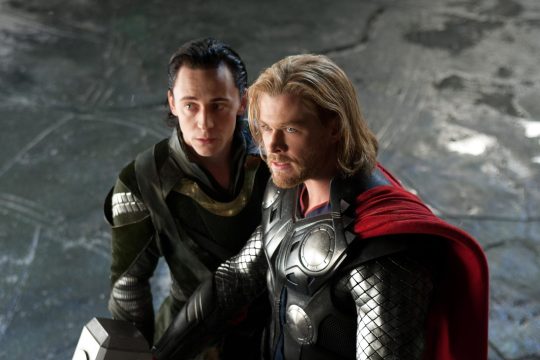
There was a lot riding on that first Thor feature. For one, no one knew if audiences would immediately latch onto a Shakespearean superhero movie partially set on an alien planet populated by the Norse Gods of legend. Second, it was integral to Feige's plans for the shared universe. Loki was supposed to be the main villain in The Avengers, which would not only mirror how Earth's mightiest heroes joined forces in 1963's Avengers #1 but also give Thor a believable reason for teaming up with Iron Man, Captain America (Chris Evans), and the rest of the capes. Feige first clued Hiddleston into those larger plans when the actor was in L.A. before Thor started shooting.
"I was like, 'Excuse me?' Because he was already three, four steps ahead," says Hiddleston. "That took me a few minutes to process, because I didn't quite realize how it just suddenly had a scope. And being cast as Loki, I realized, was a very significant moment for me in my life, and was going to remain. The creative journey was going to be so exciting."
Hiddleston relished the opportunity to go full villain in Avengers, like in the scene where Loki ordered a crowd to kneel before him outside a German opera house: "It's the unspoken truth of humanity, that you crave subjugation," says the Machiavellian god. "The bright lure of freedom diminishes your life's joy in a mad scramble for power, for identity. You were made to be ruled. In the end, you will always kneel."
"I just knew that in the structure of that film, I had to lean into his role as a pure antagonist," Hiddleston recalls. "What I always found curious and complex about the way Loki is written in Avengers, is that his status as an antagonist comes from the same well of not belonging and being marginalized and isolated in the first Thor film. Loki now knows he has no place in Asgard."
Loki did find a place within the audience's hearts, though. Feige was "all in" on Hiddleston as his Loki from the beginning, but even he couldn't predict how much fans would love him. Feige recalls the reaction at the 2013 San Diego Comic-Con: "Did we know that after he was the villain in two movies, he would be bringing thousands of people to their feet in Hall H, in costume, chanting his name? No, that was above and beyond the plan that we were hoping for and dreaming of." It was a dream Feige first got an inkling of a year earlier during the Avengers press tour when a Russian fan slipped past security, snuck into Mark Ruffalo's car, and asked the Hulk actor to give Hiddleston a piece of fan art she created. "That was one of the early signs there was much more happening with this quote-unquote villain."
Despite that popularity, the plan was to kill Loki off in 2013's Thor: The Dark World, but the studio reversed course after test audiences refused to believe he actually died fighting the Dark Elves. Alas, he couldn't out-illusion death forever. After returning in Taika Waititi's colorful and idiosyncratic Thor: Ragnarok, Hiddleston's character perished for real in the opening moments of Infinity War. In typical Loki fashion, before Thanos crushed his windpipe, he delivered a defiant speech that indicated he'd finally made peace with the anger he felt toward his family.
"It felt very, very final, and I thought, 'Okay, that's it. This is Loki's final bow and a conclusive end to the Odinson saga,'" says Hiddleston, who shot that well-earned death scene in 2017.
But, though he didn't know it yet, the actor's MCU story was far from over.
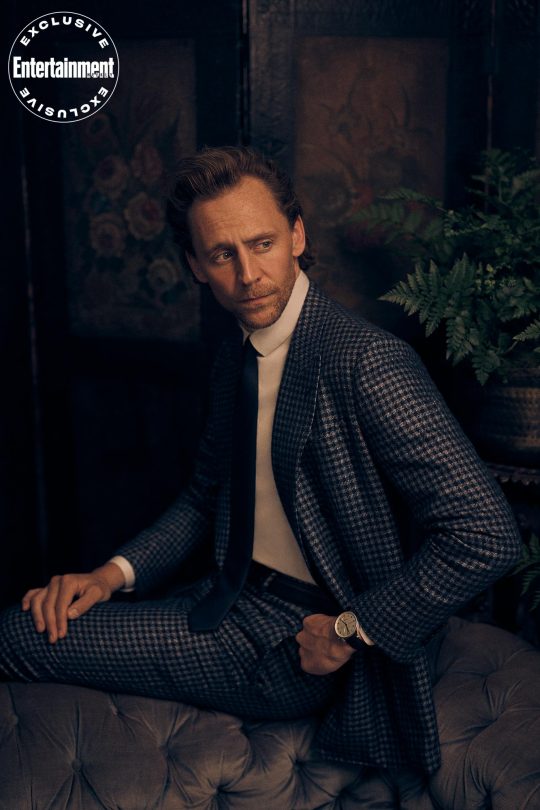
Credit: Charlie Gray for EW
When Hiddleston returned to film two scenes in Avengers: Endgame in 2017, he had no idea where Loki portaled off to after snatching the Tesseract. "Where'd he go? When does he go? How does he get there? These are all questions I remember asking on the day, and then not being given any answers," Hiddleston recalls. To be fair, it's likely the Powers That Be didn't necessarily have answers then. While Feige can't exactly recall when the writers' room for Endgame first devised Loki's escape sequence, he does know that setting up a future show wasn't the primary goal — because a Loki series wasn't on the horizon just yet.
"[That scene] was really more of a wrinkle so that one of the missions that the Avengers went on in Endgame could get screwed up and not go well, which is what required Cap and Tony to go further back in time to the '70s," says Feige. Soon after that, though, former Disney CEO Bob Iger approached Feige about producing content for the studio's forthcoming streaming service. "I think the notion that we had left this hanging loose end with Loki gave us the in for what a Loki series could be. So by the time [Endgame] came out, we did know where it was going."
As for Hiddleston, he didn't find out about the plans for a Loki show until spring 2018, a few weeks before Infinity War hit theaters. "I probably should not have been surprised, but I was," says the actor. "But only because Infinity War had felt so final."
Nevertheless, Hiddleston was excited about returning for his show. He was eager to explore Loki's powers, especially the shapeshifting, and what it meant that this disruptive figure still managed to find a seat beside the gods in mythology. "I love this idea [of] Loki's chaotic energy somehow being something we need. Even though, for all sorts of reasons, you don't know whether you can trust him. You don't know whether he's going to betray you. You don't why he's doing what he's doing," says Hiddleston. "If he's shapeshifting so often, does he even know who he is? And is he even interested in understanding who he is? Underneath all those masks, underneath the charm and the wit, which is kind of a defense anyway, does Loki have an authentic self? Is he introspective enough or brave enough to find out? I think all of those ideas are all in the series — ideas about identity, ideas about self-knowledge, self-acceptance, and the difficulty of it."
“The series will explore Loki's powers in a way they have not yet been explored, which is very, very exciting.”
The thing that truly sold Hiddleston on the show was Marvel's decision to include the Time Variance Authority, a move he describes as "the best idea that anybody had pertaining to the series." Feige and Loki executive producer Stephen Broussard had hoped to find a place for the TVA — an organization that debuted in 1986's Thor #372 and has appeared in She-Hulk and Fantastic Four stories — in the MCU for years, but the right opportunity never presented itself until Loki came along. "Putting Loki into his own procedural series became the eureka moment for the show," says Feige.
The TVA's perspective on time and reality also tied into the themes that Waldron, Loki's head writer, was hoping to explore. "Loki is a character that's always reckoning with his own identity, and the TVA, by virtue of what they do, is uniquely suited to hold up a mirror to Loki and make him really confront who he is and who he was supposed to be," says Waldron. Hiddleston adds: "[That] was very exciting because in the other films, there was always something about Loki that was very controlled. He seemed to know exactly what the cards in his hand were and how he was going to play them…. And Loki versus the TVA is Loki out of control immediately, and in an environment in which he's completely behind the pace, out of his comfort zone, destabilized, and acting out."
To truly dig into who Loki is, the creative team had to learn from the man who knows him best: Hiddleston. "I got him to do a thing called Loki School when we first started," says director Kate Herron. "I asked him to basically talk through his 10 years of the MCU — from costumes to stunts, to emotionally how he felt in each movie. It was fantastic."
Hiddleston got something out of the Loki school, too. Owen Wilson both attended the class and interviewed Hiddleston afterward so that he could better understand Loki, as his character Mobius is supposed to be an expert on him. During their conversation, Wilson pointedly asked Hiddleston what he loved about playing the character.
"And I said, 'I think it's because he has so much range,'" says Hiddleston. "I remember saying this to him: 'On the 88 keys on the piano, he can play the twinkly light keys at the top. He can keep it witty and light, and he's the God of Mischief, but he can also go down to the other side and play the heavy keys. And he can play some really profound chords down there, which are about grief and betrayal and loss and heartbreak and jealousy and pride.'" Hiddleston recalls Wilson being moved by the description: "He said, 'I think I might say that in the show.' And it was such a brilliant insight for me into how open Owen is as an artist and a performer.'"
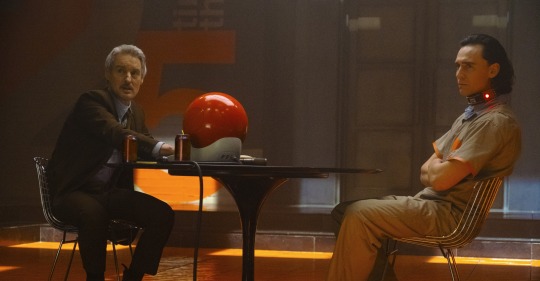
Owen Wilson as Mobius and Tom Hiddleston as Loki in 'Loki.'| Credit: Chuck Zlotnick/Marvel Studios
Everyone involved is particularly excited for audiences to see Hiddleston and Wilson's on-screen chemistry. "Mobius is not unlike Owen Wilson in that he's sort of nonplussed by the MCU," says Feige. "[Loki] is used to getting a reaction out of people, whether it's his brother or his father, or the other Avengers. He likes to be very flamboyant and theatrical. Mobius doesn't give him the reaction he's looking for. That leads to a very unique relationship that Loki's not used to."
As for the rest of the series, we know that Loki will be jumping around time and reality, but the creative team isn't keen on revealing when and where. "Every episode, we tried to take inspiration from different things," says Waldron, citing Blade Runner's noir aesthetic as one example.
"Part of the fun of the multiverse and playing with time is seeing other versions of characters, and other versions of the titular character in particular," says Feige, who also declined to confirm if Loki ties into Doctor Strange in the Multiverse of Madness and/or other upcoming projects.
Making Loki was especially meaningful to Hiddleston because they shot most of it during the pandemic, in late 2020. "It will remain one of the absolute most intense, most rewarding experiences of my life," he says. "It's a series about time, and the value of time, and what time is worth, and I suppose what the experience of being alive is worth. And I don't quite know yet, and maybe I don't have perspective on it, if all the thinking and the reflecting that we did during the lockdown ended up in the series. But in some way, it must have because everything we make is a snapshot of where we were in our lives at that time."
While it remains to be seen what the future holds for Loki beyond this initial season, Hiddleston isn't preparing to put the character to bed yet. "I'm open to everything," he says. "I have said goodbye to the character. I've said hello to the character. I said goodbye to the character [again]. I've learned not to make assumptions, I suppose. I'm just grateful that I'm still here, and there are still new roads to explore."
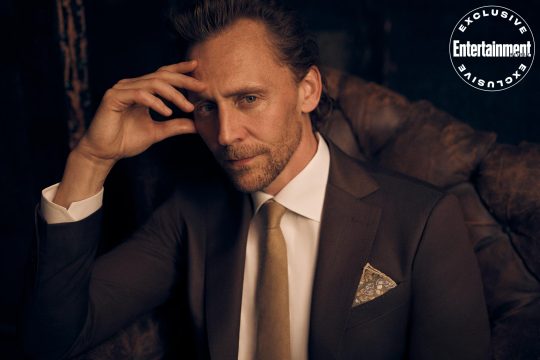
518 notes
·
View notes
Text
Misty-eyed Confessions:
A Reflective Paper on the Anthology, “Lockdown Litanies: Countless Untold Stories”

Lockdown Litanies: Countless Untold Stories is an anthology of poems full of woe and and loss. It is composed of 9 poems, each telling different stories and having their own style. The poems are written like it was in a dim room, underneath the covers, with only a flashlight as its source of illumination. It is greatly written as I think I can feel what the author is feeling as she was writing it, the emotions she would want us to experience as we were reading it. These are poems of experience. The hurt, the loss, the pain one experiences in life as they stumble through it. Feelings realized and written in time of chaos.

As I was reading “Dear Diary”, I was under the impression that it was written for someone, despite it already having addressed the diary in the title. I was only half-right I think, as the poem really is written for someone, and that someone is the author herself. It talks about the problems she faced, the burden she carries, and the way she coped. I related a lot of what is said in the poem. My mother was also hospitalized during the lockdown, I lost a lot of people. “It felt different. I, too, became different—” was a line I related to the most. I feel differently to who I was then. I grew, but I also became lonelier? Sadder? Just somehow not who I’m supposed to be. The poem reminded me of Unwell by Matchbox Twenty. The line “My head created more voices to fill the void” from the poem was like “All day starin' at the ceilin' makin' friends with shadows on my wall”. Both lines are about loneliness, and how loneliness can turn into something bad. The end of the poem is giving out a hopeful feeling though, reminding us that we aren’t crazy, just a little bit unwell.

The second poem, “The Tale of a Modern Sisyphus” is very interesting. Just by the title, I was already intrigued. It was subtle but at the same time, obvious. It was about the presidential elections that happened just this May 2022. It was creatively written, relevant, and such a shame that it had to be written. Instead of celebrating a success, a loss was written. Instead of getting competence, we got ineptitude. Truly a waste, our country has. Now, we are left to wonder what could’ve been. The line “Holy! Haven’t seen a woman who’s clearly a ten— // Let alone the judges; they chose a far less seven.” from the poem reminded me of the line “The game was rigged, the ref got tricked // The wrong ones think they're right // You were outnumbered, this time” from Only The Young by Taylor Swift.

To continue, the third poem O’Yayi is written in prose structure. It made me feel emotional as I felt the unrequited love from the author. It told the story of a woman settling down with someone else as she lost her ‘true love’ from war. How the author is worried about who she will choose in the afterlife, if they ever meet again. It gave Lips of an Angel by Hinder vibes. As both song and poem uses voice/melody as a way to be reminded by past love. “With a soft, almost romantic lullaby playing and a small figure of a couple twirling, music and magic would soon fill up the entire space, and my ears would be welcomed by a familiar sound. Dante?” from the poem and “It's really good to hear your voice saying my name // It sounds so sweet // Coming from the lips of an angel // Hearing those words, it makes me weak”

Next, we have Two Red Laces on the Wonderwall. I felt that it was about loving someone who doesn’t feel the same way the author did. The author gave her all her affections, only for him to give only a fraction of his. I do relate to this as sometimes I feel that there are people who are only after some parts of me, like how the subject in the poem is after her body only. The “maybe you should get tested” made me think it is about an STD test, thus having the conclusion that they have a ‘friends-with-benefits’ relationship rather than being proper lovers. The whole poem reminded me of I Need to Know by Sleeping with Sirens. “You are my universe, I was your falling star” and “Two starlit lovers, we were destined to be torn apart” lines from the songs that I feel supported my statement.

Another poem in the anthology is Umbilical. It is a poem about loss. Losing a mother has got to be the hardest thing to get through. I had the same fear as my mother was diagnosed with COVID last year. I kept praying, begging to anyone who’s listening to save her. She wasn’t with us as the government took her to a facility. All four of my siblings and I were left at home, not knowing what was going on with her. I would probably never get over losing her and I thanked everyone who was there for her and ensured her safety. Fearing for her life is one thing but actually losing her? It would have been the end of me. “You have made your purpose, I guarantee. // Hush, sleep tight. Everything will be alright. // Lilom, Lilom, I beg. Spare her for me.” is a line from the poem that reminded me of “Tonight I've fallen and I can't get up //I need your loving hands to come and pick me up // And every night I miss you // I can just look up // And know the stars are // Holdin' you, tonight” from the song Tonight by FM Static.

The fifth poem in the anthology is RE: Paper (I’m Red, IMRaD)*. I would say that the poem is all about the social issues our country is currently facing amidst the new people on the seat of power. It is mostly about the educational issues that give troubles to both students and teachers alike. The song War by Sleeping with Sirens is most applicable with poems. It was opened with “this house of lies is stained with blood”. Another line from the song “when will we know our wrong from right? // to me it seemed that we have lost our sight // we were blinded by our right”.

3 A.M Awakening is another poem in the anthology. From what I understand, it is about someone exhausted from life. Someone who thinks happiness will come in the form of rest, permanently. It would be a bit silly to hear especially if said to grown ups but the poem is very relatable. The first line, “Breathe gently ten times and let anger go” is something always said to me when someone wronged me. I am always supposed to take the high road and forgive someone, even if they aren’t even sorry. “Breathe as if it’s easy to do today” is also true. Some people wake up and thank God they’re still alive. But sometimes, living is exhausting. Bit ungrateful but it’s how I feel. “I've been up for days // I can't tell the difference from sleeping away // I'm losing my patience // I can't feel my faith” is a line from the song Sarcoma by Killstation.

Like the previous poem, My Frail Lady is a poem about hurt. It’s an idyllic poem with dark lines. The poem, I think, is about suicide. Falling to the ground at such a high place. The line “Soon she will be found— Dancing on her own” meant that she will be all alone but happy when she dies. The song Bullet by Hollywood Undead is a song most applicable here. “I've been trying too long with too dull of a knife // But tonight, I made sure that I sharpened it twice” is a line from the song that also implies suicide but presented with a fun upbeat tone.

To sum it all up, all the poems from this anthology showed the different sides of the author. All her pain, her opinions. So many of her lines I related to. These series of poems gave her a medium, an outlet to let out all her untold stories in this time of hardship. Braving the world of pain, not letting it get to her. These are the tears she refused to let fall. She wrote her confessions with misty eyes.

3 notes
·
View notes
Text
axelzp replied to “The Bad Batch”:
I think most people take issue with Omega and TBB due to concerns over whitewashing. Also, what do you have against the explanation of the biochips? Personally, I always thought it fit Palpatine's controlling nature better than the idea of clones just getting a command from some random guy in a hood, telling them to kill the Jedi.
First off, I apologize it took me so long to answer. I tried to explain my reasoning in a short and coherent way as possible, but apparently the years of frustration about this issue needed more space to be properly addressed. So, in advance, sorry for text length.
From all TCW changes done to star wars, the chip-in-brain is one of my top 3 reasons to dislike the whole TV show, despite many of its good moments. I understand why authors chose this sub-plot that allows them to separate the visibly individual "good" clones (thus making them more likeable for the audience / marketing) from the “bad” that kill the Jedi but frankly, I find it a cheap and kinda problematic excuse. Clones were victims regardless of which version people will accept but I really despite the idea that Jedi were their beloved generals and commanders - so beloved that clones actually had nightmares about killing them waaay before Palpatine ultimately won which undermines the whole point of Order 66.
Jedi could never expect clones to shoot them in the back because they were used to their unquestioned obedience from the start of war. It was common knowledge, repeatedly mentioned in sources like “Jedi Trial” that clones were “bred to war, bred to discipline, bred to obey without question the orders of the powers that paid for their services”. Clones were made that way by genetic manipulations and years of intensive training; an indoctrination that makes clone troopers believe they have obey, no matter what cost.
Some sources, like Clone Wars Adventures’ “Orders” outright show us the mindset of clones:

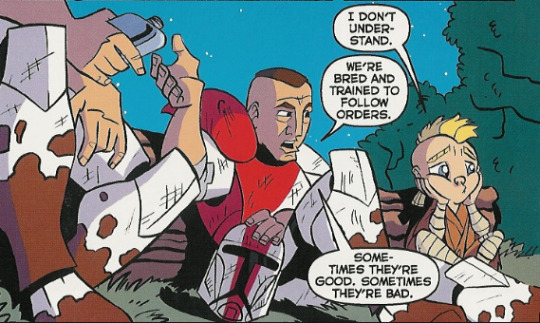
and We’ve got nothing but each other ad our orders.
Because of that worldbuilding, I prefer Legends take on clone obedience and the Jedi approach to the problem than what TCW created. I talked about it more here, but the general sense is that I feel cheated by the idea of chips that turn people into some “programmed” machines because in such way, TCW erased the Jedi & Republic part in abuse & enslavement of clone troopers, while at the same time giving an unrealistic idea that Jedi were so liked / respected when most of clones did not have any special bond with them. And this is less about if Jedi were good military leaders or not and more that as generals/commanders they didn’t interact that much with common troopers. Because the chain of command doesn’t work like that. I’m willing to buy the close(r) bond between Anakin & 501st because frankly Darth Vader himself from the start was built as someone with better relationships with common troopers / “normal” officers than with most of the high ranking officers presented on screen. I’m pretty sure some other Jedi were caring and liking clones (and vice versa) but it is impossible for generals to know and be so close to all of their troopers.
Above everything else, Legends created an interesting situation in which the Jedi Council / Order knew clones would follow orders no matter if those were right or not and were aware how dangerous it could be yet they still didn’t do anything about it, because the obedience of clones were beneficial for them. Jedi not only took for granted their obedience, they mistook it for respect.
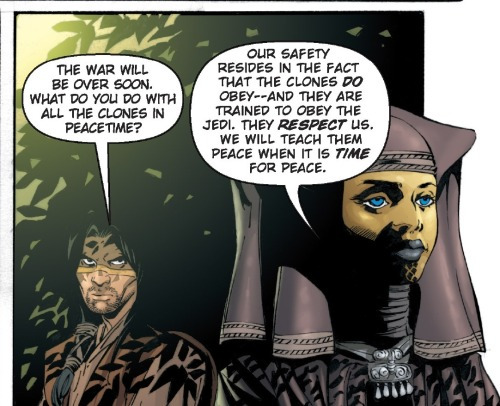
Which really speaks a lot about Jedi's own moral failing and/or lack of understanding the difference between those two terms.
In the Legends sources, there was no need for chips, really, when from the start Kaminoans tinkered with clone genome, created the effective system of “proper” education to mold clones into obedient soldiers and Republic wasn’t really interested to undo the damage done by such indoctrination.
Before TCW brought the chips and “nightmares haunting clones” there were officially established Contingency Orders for the Grand Army of the Republic: Order Initiation, Orders 1 Through 150. A guideline for unexpected and/or critical situations, so the Great Army of Republic [GAR] would know how to proceed - especially when troopers were given contradictory orders. The orders (also known as Clone Protocols) weren’t secret and there is a big chance that Jedi knew it, if someone bothered to learn the manual. The whole formula of Order 66 was described as:
"In the event of Jedi officers acting against the interests of the Republic, and after receiving specific orders verified as coming directly from the Supreme Commander (Chancellor), GAR commanders will remove those officers by lethal force, and command of the GAR will revert to the Supreme Commander (Chancellor) until a new command structure is established."
And here how the scene played in the RotS novelisation:
That concealed compartment held a secure comlink, which was frequency-locked to a channel reserved for the commander in chief.
Kenobi nodded and spoke to his mount, and the great beast overleapt the clone commander on its way down into the battle.
Cody withdrew the comlink from his armor and triggered it.
A holoscan appeared on the palm of his gauntlet: a hooded man.
"It is time," the holoscan said. "Execute Order Sixty-Six."
Cody responded as he had been trained since before he'd even awakened in his creche-school. "It will be done, my lord."
The holoscan vanished. Cody stuck the comlink back into its concealed recess and frowned down toward where Kenobi rode his dragonmount into selflessly heroic battle.
Cody was a clone. He would execute the order faithfully, without hesitation or regret. But he was also human enough to mutter glumly, "Would it have been too much to ask for the order to have come through before I gave him back the bloody lightsaber. . . ?"
The order is given once. Its wave-front spreads to clone commanders on Kashyyyk and Felucia, Mygeeto and Tellanroaeg and every battlefront, every military installation, every hospital and rehab center and spaceport cantina in the galaxy.
So there is really no “random hooded guy” calling clones to kill Jedi but Chancellor himself using an appropriately secured military channel with confirmation of his identity to issue a legal order in a critical situation (an opportunity created by the Jedi Council themselves who went into the Senate building to kill Palpatine). So why the clones shouldn’t listen, when the order came directly from the Supreme Commander of the Great Army of the Republic?
Of course, the movie (and novel based on it) alone has this weird addition like “yes my Lord'', what I personally consider as the cinematic way to show the switch from Chancellor Palpatine to Emperor Darth Sidious. Still, I’m willing to give some benefit of doubt about the modification made by Kaminoans and if Order 66 could trigger anything hidden in clone subconscious. But even if there was something, it didn’t erase their personalities or changed the way clones behaved like it happened in The Clone Wars and The Bad Batch.
One way or another, the Order 66 worked out because clones “have no malice, no hatred, not the slightest ill intent that might give warning. They are only following orders”. Which I guess comes down to how clone troopers were presented - or maybe rather how they were seen by other characters in the Legends. As more detached, combat pragmatic, toned down, to some degree isolated from the outside world, less individual. Regardless of what Jedi or Republic citizens thought about clones, it did not make them any less human beings.
And here comes the paradox of The Clone Wars. The TV show made great effort to humanize clones by presenting them as very individual, outstanding people which in itself is a great thing. The names, the tattos, the different paintings of armours, visible variety of behaviour. All great to make the audience see clones as human beings, to get emotionally invested into them, because the more likeable clones were the better for marketing the story (and the cynical part of me thinks it really comes down to making money, isn’t it?)
But this effort became also the trap and the inhibitor chips is the excuse to make such loved, caring and brave characters into the detached clones gunning down the Jedi in Revenge of the Sith.
The things that irks me a lot about this situation is the feeling like fans started care for clones because they were made into different type of characters than what they were (similar like Anakin’s movie characterization was thrown out of the window, to make him more suitable for fans who wanted the badass typical male hero instead of introverted, conflicted and traumatized young man). The clones get the visible individuality to make them the heroes we should root for, but then there is the “magical” switch that will cut down their heroic deeds because now they are “bad” and stormtroopers can’t have any personality. Which is just… frustrating.
Don’t get me wrong, I adore how clone troopers get more visible individuality (even if sometimes if felt too exaggerated), but the “not standing out from the group” was something that kept clones alive on Kamino and I can see why it was used as coping mechanism (the safe option) during the war. I regret that The Clone Wars didn’t show the transition from AotC nameless troopers into such individuals and how much it happened thanks to Jedi, what may help to build the feeling of supposed strong bond between Jedi and troopers. Because frankly, when we met TCW!clones, they already have names, different colors and marks on armor plates and helmets and for all we know, they could create their own “culture” without Jedi influence.
The final part of why I hate the chip-in-brain sub-plot is how it changed clones. Because even if that was a means to force clones into killing Jedi & ensure that Order 66 will be carried on no matter what, it shouldn’t change them into bullies toward their own brothers. But now in The Bad Batch, the clones don’t speak between themselves, are aggressive toward others and generally act like assholes for no real reason. And yeah, I get this may be a cinematic metaphor for a change from “good” republic soldiers into “bad” imperial stormtroopers and most likely something along the way “Republic/Jedi gave you individuality, Empire takes that away” but frankly, Republic did not give anything to clones. It did not acknowledge their human right, didn’t have any plan for their future, didn’t pay for their service or more expensive medical treatment for that matter, did not teach them they could - should - make their own choices.
Now clones are cheering for the Empire because inhibitor chips! They are assholes, because inhibitor chips! They shoot their *beloved* Jedi generals because of the chips!
And in a way, I get this resolution, the chips make it clear clones were victims. But even without them, they were victims from the start. Except now clones are “programmed” while in Legends the senate (a power paying for their life) officially and legally renamed Republic into Empire and clones were glad for still having a purpose in life. The war ended (thus their usefulness), but they were still needed - still wanted - instead of being put down or closed at Kamino or whatever. I can see why the uncertainty of the future made clones cheering up for the Empire. And frankly, I personally prefer them not caring for the political change (because why should they? It never was their job to *judge* the rightness of their superiors) instead of being “programmed” like some droids and playing the role of fodder to kill for the “good guys”.
Dunno, if I explained properly my issue with inhibitor chips, it just feels to me as not really convincing and a too risky concept in the bigger picture of the things and the fact that Jedi just like that ignored this suspicion matter of Tup and Fives and biochips doesn’t help either. Like I said, I understand why the chips were introduced to the story, as the excuse in the change of clone troopers’ behaviour but at the end of day, Legends worldbuilding will always make more sense to me. I don’t need overly done differentiation of clones to care for them as an individual human beings (and it kinda seems to me like that, clones suddenly became fan favorite when every looks or act differently but not when the AotC literally presented them as an army created to blindly obey Jedi/Republic) and I don’t blame them for sticking with Empire because what better option they had, considering their upbringing and the pathological system in which they lived all their life?
Dunno, I’m biased and may just have allergy to TCW in general.
As for Omega, I’m not really surprised about this concern, especially after seeing TBB’s version of padawan Kanan (that if not for A) some basic knowledge about his backstory and B) Depa Billaba calling him by name, I would probably never have figured out who he was supposed to be). But for Omega alone, I don’t mind her look, because I’m used to Legends!Jango’s biological family in which his mother and sister were both blond haired women and frankly, some “defective” clones (including Rex?) apparently could be blond too, so it seems like Jango’s genome has a recessive gene somewhere for that color of hair. I try to hold my judgment about Omega and her appearance until the full backstory will be revealed because there is still a chance that Fett’s DNA was mixed with someone else's (still I hope Omega is not force sensitive…). I mean, Hunter has heightened senses while Wrecker has almost supernatural strength and both traits seem to be not really human, so who knows what Kaminoans really did with them.
I understand people’s emotional response to Disney’s approach to characters and their visual look, especially since it isn’t the first screw up in New Canon (the models for characters in general and New Mandalorians especially). I’m totally okay with people’s criticism of that matter and demanding from Disney more diversity and respecting the already established ethnicity of certain groups. I’m aware I may not be sensitive enough to that matter as some other people (even more with barely watching TV shows to have any current and up-to-date comparison to trends in cartoons) and I’m pretty sure more qualified / invested fans already wrote or will be writing soon great metas about that. But the thing that irks me is hearing people saying that Omega *can’t* be Jango’s clone - I don’t like this sort of exclusion based on someone’s look alone. She may not look like Fett or other (male) clones but it is not something Omega chose for herself and does not erase her connection to the rest of the Bad Batch. Being angry at Disney/creators for her look is a different matter I don’t have any problem with.
#star wars#my replies#sorry it took so long and for#long post#feel free to ignore it#years of frustrations about TCW get better of me#new canon vs old canon#clone troopers#i hate chip in brain nonsense#if anyone missed it#but no really#i don't remember people caring that much for clones when prequels came#tcw made clones the same as anakin#as different that they were in movies#and suddenly fans love them and care heh#but the imperial stormtroopers can't be liked or loved or good so lets use a chips in brains#and treat clones as programmed soldiers who are now jerks#so no one is gonna be sad when they were killed by the good guys#isn't it frustrating?#the paradox of TCW#i feel like i need to shut up#sorry
78 notes
·
View notes
Text
Crooked Kingdom Review 🕰️
Holy shit.
(spoiler warning, duh)
Book: Crooked Kingdom (Book 2 of the Six of Crows Duology)
Author: Leigh Bardugo
Rating: 5.5/5
The Plot
This book took me a bit longer to finish because I wanted to absorb as much of the plot as possible because of how much action there was. Every chapter had something going wrong (cough cough part 4) which made it impossible to put the book down. Some parts literally had my heart racing.
There were a lot of interesting moments and I would hardly say they were predictable. At some parts of the book I literally had to just...sit there and just think about how incredible the twists were. I never expected anything to happen, and the way things played out in the end were mind-blowing. I loved the way the plot expanded and it was very satisfying when the book ended.
The Characters
"Where do you think the money went?" he repeated.
"Guns?" asked Jesper
"Ships?" queried Inej.
"Bombs?" suggested Wylan.
"Political bribes?" offered Nina. They all looked at Matthias. "This is where you tell us how awful we are," she whispered.
I fell in love with every single character and watching them grow made me so happy. I think personally I loved Kaz Brekker the most in this book because you really got to see how his trauma left him scarred, as well as how skillful he really is when it came to the missions. The smallest details of Kaz's character just built him into such an awesome character. His backstory expanded, explaining so many things that I didn't even think I needed to know until I read them. Plus the fact that he basically wrote the book. Leigh made up the idea for the plot and Kaz said "I'll take it from here".
"I don't hold a grudge. I cradle it. I coddle it. I feed it fine cuts of meat and send it to the best schools. I nurture my grudges, Rollins"
And that was what destroyed you in the end: the longing for something you could never have.
Inej stole my heart again and again and for what. She really is such a well-built character with amazing determination. The beginning literally had me shaking (It was also the part of the book that had my heart-racing) because I really felt for Inej. Leigh also wrote Inej's kidnapped chapters perfectly, it felt so real. Her showdown with White Blade was so beautifully written and honestly Dunyasha was such a cool character I almost wish she was developed into something more rather than killed.
Anyway, Inej holds a place in my heart and it was refreshing to have such an in depth character, from her history at the Menagerie, to her references of her culture (which were so beautiful). It really made her stand out from the rest of the crew and she was just an incredible character.
"That was how you survived when you weren't chosen, when there was no royal blood in your veins. When the world owed you nothing, you demanded something of it anyway."
"The Suli believe that when we do wrong, we give life to our shadows. Every sin makes the shadow stronger, until eventually the shadow is stronger than you."
Her heart was a river that carried her to the sea.
Jesper was the character I resonated the most with. His backstory was so interesting and structured, but simple. I did enjoy the appearance of his father because it added an element of Jesper's character we didn't see much of before. We got to learn his backstory and learn about his relationship with his father. His unhealthy habits was also something I resonated with so it comforted me to be able to understand this character and connect with him. Also, I love the fact that his ADHD was given more attention to show how and why he dealt with situations the way he did. Also, when he bent the direction of the bullet at the last part...chills. He's my ultimate comfort character and I loved getting to know him.
Guilt and love and resentment were all tangled up inside him, and every time he tried to unravel the knot in his gut, it just got worse.
There's a wound in you, and the tables, the dice, the cards--they feel like medicine. They soothe you, put you right for a time. But they're poison, Jesper. Every time you play, you take another sip.
Nina was definitely one of my favorite characters to see grow. The creativity that was put into her powers was amazing and she was just such a badass. She could literally raise fuckers from the DEAD????? That shit made me lose my mind like how powerful can she GET. She was definitely an awesome character and I really wished we got some more on her powers and her story after they got their money.
She was the Queen of Mourning, and in its depths, she would never drown.
Wylan...sweet Wylan. I love him so much it hurts. He was such an entertaining character and his courage was awesome, he really stood out from the rest of the characters because of how different he was from all of them. He also admired all of the crows and was treated like a little brother by all of them which was so cute. The character development went from "Why am I here?" to "How can I help?" and I loved seeing him become a part of the crows. Also in that last scene where he's just leaning against the wall, beat the fuck up, was so good SAINTS.
Wylan summoned every bit of bravado he'd learned from Nina, the will he'd learned from Matthias, the focus he'd studied in Kaz the courage he'd learned from Inej, and the wild, reckless hope, he'd learned from Jesper, the belief that no matter the odds, somehow they would win.
But they were his first friends, his only friends, and Wylan knew that even if he’d had his pick of a thousand companions, these would have been the people he chose.
Matthias back with his long ass chapters (until chapter 40 LOL) (i'm so sorry that was outta pocket). Anyway, I still had meh feelings for him but I loved him and Nina's relationship. Yes, I shed a few tears when he died that shit hurt come on now. I did like to see his protective side and him overcoming his fears and past beliefs. The character development in him was immaculate.
He was on the ice once more, and somewhere he could hear the wolves howling. But this time, he knew they were welcoming him home.
The Ships
Kanej: cries. literally in tears. bawling my eyes out. throughout the entire book. THEY HELD HANDSSSSSS, HE OPENED UP TO HERRRRR, THE SHIPPPP AND THE PARENTSSSSSSSS AHHHHHHHHHHHHH MY HEARTTTTTT
I would come for you. And if I couldn't walk, I'd crawl to you, and no matter how broken we were, we'd fight our way out together--knives drawn, pistols blazing. Because that's what we do. We never stop fighting.
Wesper: adorable adorable adorable. my favorite gay mfs in the world. Jesper is such a fucking flirt though he had ME blushing. Also when Jesper kissed Kuwei HAHAHA WHATTT, the way Kuwei was like �� had me gone. Anyway, the chemistry between these two was something else (so much better than in the first book) and the ending with them was wholesome I'm so happy they got the happy ending.
Wylan shrugged. “Maybe. Not all poisons have an antidote.” Jesper snorted. “That’s why we call him Wylan Van Sunshine.”
This was the kiss he’d been waiting for. It was a gunshot. It was prairie fire. It was the spin of Makker’s Wheel. Jesper felt the pounding of his heart—or was it Wylan’s?—like a stampede in his chest, and the only thought in his head was a happy, startled, Oh. (<3)
Helnik: cries. again. sobs. This one hurt me so bad, I literally was just sitting in my bed staring at the wall, book in hand, crying. They had such a beautiful relationship and they grew so much together it HURT. The way Matthias was so protective of Nina and was always worrying about her. They planned their future together in their heads all the time. They were SO HAPPY WHY COULDN"T THEY JUST BE HAPPY.
They deserved the world.
I will always protect you, even in death, I will find a way.
You aren't a flower, you're every blossom in the wood blooming at once. You are a tidal wave. You are a stampede. You are overwhelming.
Final Thoughts:
My final thoughts are scattered throughout the review, but overall this book took everything from Six of Crows and made it better. It broke me, made me laugh, had me angry as fuck, but it also left me feeling like I knew these characters and they knew me. It really was so much better than the first book in so many different levels and I will never get over this book. Truly better than waffles.
#crooked kindgom#kaz brekker#six of crows#kanej#the crows#jesper fahey#wylan van sunshine#inej ghafa#kuwei yul bo#pekka rollins#no mourners no funerals#kaz x inej#soc#book review#booklr#helnik#wesper#mathias helvar#queen of mourning#grishaverse
41 notes
·
View notes
Text
WoF: The Dragonet Prophecy (Books 1-5) Review
Note: I will be judging these books as what they are (i.e. a book series for 8-12 year olds) and not for what they aren't.
Warning for spoilers (obviously).
Praise:
My biggest praise is that the story flipped the "chosen one" trope. Though it took four books, we learn that the prophecy is all made-up. No one is special. And yet, they complete the prophecy anyway. They end the war even though they aren't destined to because they try and I really like that message for kids--that you don't have to be special or "chosen" to change the world.
I also really liked that there was an in-world explanation for the prophecy. A lot of stories will just toss a prophecy in from an old book or a legend and leave it at that. But the explanation that NightWings have the gift of prophecy (which is sorta true i.e. Darkstalker + Moon Rising, which I haven't finished) allowed me to enjoy it much more. I normally won't touch any "chosen one" stories because it always seems to me like the author is saying "I have no idea why you should care about my protagonist other than You're Supposed To".
I also loved that there was a political and underhanded reason for the prophecy. The story repeatedly shows how the different dragon tribes have their own motivations behind their actions, including who they decide to back in the war. It's a great way to explore that concept.
I love that the societies are matriarchal. You rarely see that in fantasy and for a kids book I love it. Its so refreshing.
It was great that the gender split with the main cast was 3-2 female-male; normally it is overbalanced in favor of males so that was nice.
(More Below Cut)
In the beginning of each book, the species guide is specifically "A NightWing's Guide" which deliberately includes false information (that all/most NightWings have telepathy and can see the future) and excludes known/little-known information (that RainWings are venomous). I like the narrative explanation for misleading the readers. And, maybe it's too subtle for kids to fully comprehend, but it plays on the idea of bias in research, especially with the five dragonets reading scrolls which were mostly written by NightWings and therefore exaggerate their own powers and downplay RainWings for their own political reasons. I definitely think the target audience will pick up on at least some of that.
I liked that none of the dragonets wound up getting the blood families they wanted. Clay doesn't even really have parents but he has a bunch of siblings, and Glory found a brother and a great-something grandmother; Starlight is probably the worst off with his dad basically being a Nazi scientist and having a dead mom; Sunny probably got the best deal with a kickass mom and a dad that is still alive and very nice if depressed and lost. I like that the dragonets chose to stay together after they "fulfill" the prophecy. That's what families do.
I love the different societies, customs, and social structures in the different dragon tribes. I am very endeared to the MudWings having sibling-based families w/o parents. Though I am uninterested in the militarism, I still like it because its different. No one culture felt like a carbon copy of the other.
I'm pretty soft for the crushes/budding romances the dragonets have, even if I have certain issues with them. But I definitely really like Tsunami/Riptide; it's a very complex relationship and I love the class difference; I'm also soft for the drama of Clay/Peril, with him being one of (if not the only) dragon who can touch her without dying; I also like that, at this moment at least, it appears Clay isn't aware he has any feelings for her, or doesn't have any at all.
I am a big fan of the canon one-sided Starflight/Sunny because Sunny takes the majority of her own book to decide how she feels about it and tells him she does not reciprocate. I love that he finally gets the courage to tell her, and she eventually rejects him, and they still stay friends. He accepts that she doesn't feel that way about him, and sure it hurts him, but that's okay. I love that not every relationship in this story is reciprocated and that it shows kids they can still be friends with someone that rejects them/they reject.
I do like that the characters make their crushes their last priority. Yeah, Tsunami likes Riptide, but she 15 million things she needs to worry about, several of which involve death. The characters never lose sight of their goals and the story doesn't derail into their crushes.
Criticism:
(So far) Sunny is the only main character who does not have a potential partner she is being shipped with in canon, and half of her book was still about a potential relationship w/ Starflight. I am endeared to most of these budding romances but I really wish not every main character had to have a romantic element to their story.
I am somewhat soft to Glory/Deathbringer but I do dislike how rudely she talks to him. That's my only real complaint. I love that he's a smartass and couldn't go through with killing her but I think she's too rude to him and it's treated like a joke too much.
This is only half criticism but some of these deaths are very violent. But the reviews are all great for the book on Amazon and I don't hear teachers or parents trying to ban these books for violence so maybe this is an acceptable level of violence for this reading group. Obviously as an adult I don't care but every time a dragon had their throat ripped open or their head cut off I was just baffled that this is a kids' book. But, if it was truly such an issue, I'm sure the publisher would have toned the death scenes down. So that's why its only half a criticism.
I thought it was a bit repetitive that all three female dragonets wound up either inheriting a throne or becoming in-line to inherit a throne.
I understand there's a particular level of nuance to many of the Queens, but I really wish Queen Coral's eugenicist ideology was criticized more? (It was a very minor detail; she offhandedly mentioned one of her stories that's a "metaphor about class differences and genetic superiority". If they're not going to acknowledge it, and keep on having Tsunami defend her mom ("stupid SeaWings, already having a good Queen" when complaining that Glory needed to overthrow the inept RainWing Queens), then it shouldn't have been included. You can't drop something that gross without confronting it. Maybe they do later, I don't know.
Related, I wish the books would criticize monarchy. Maybe in the later books they do, but all they do is criticize the individual monarch and not the system itself. Sunny could've made the SandWings elect their new leader (not that I don't love Queen Thorn) but instead she perpetuated the system of inherited power.
I know this is stupid, and its simply a pet peeve, but RainWings aren't really venomous. They don't sink their fangs into dragons and inject them like snakes would; they spit a substance at them that melts their fucking scales and eats their flesh which would be acid. It just reminds me of that "if it bites you and you die, its venomous; if you bite it and you die, it's poisonous" meme. If it spits on you and you die, its acid. I want kids to know the difference between poison, acid, and venom.
Feel free to comment in the tags/replies what you loved/hated the most! I really want to discuss the first five books with other people.
#wings of fire#wof#the dragonet prophecy#wof spoilers#wof 1-5#wof the dragonet prophecy#spoilers#book reviews
13 notes
·
View notes
Text
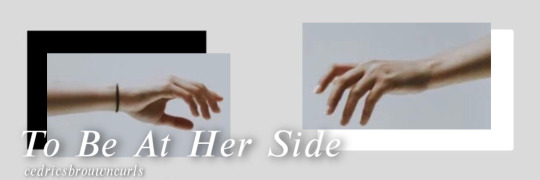
3 • Hurricane
series summary: alone almost everyday from the moment you were born, thrown to the side by everyone in society because of who your parents were and who you were said to be, a death eater. Your parents were to of the most powerful dark wizards ever known and because of that you were shunned everywhere you went. When the hufflepuff golden boy sees you for the first time and falls, but is he willing to be judged, feared, and hated, and how far will he go, To Be At Her Side.
chapter summary: everything seemed to be going well, for a short amount of time everything felt right. cedric had grown closer to you and became a friend. But all good things come to an end, and yours came with something you could have never seen or expected.
warnings: flashbacks, mentions of violence, threats.
tag list: @mullthingsoverinthehotwater @hoe4cedricdiggory @queenl04 @persephone-archives @0niko-san @annasdani @joalinbenefits @awritingtree @confuscita @badgal-jackie @cedricsfluffyhair @degeathesaviour
word count: 3.9k
a/n: there’s quite a lot to absorb in this chapter, but I love how it turned out!
enjoy <3
__________________________________________
“In the eye of the hurricane, there is quiet for just a moment.”
Before every storm, there is a calm. When everything feels right, everything seems to fall into place. You think everythings is going to be alright.
And for a while it was.
You had someone beside you, a friend you could nod at in the hallways, or talk about homework with, and it was enough. You spent your entire life doing everything alone, and suddenly it all changed. A grey eyed hufflepuff had managed to sneak into your lonely existence and put a smile on your face. It was sweetly excruciating. You were truly grateful for his company, and enjoyed having Cedric around, it was just hard showing him that, when you had never had a friend before. You were in forigen territory and you could tell Cedric found it hilarious.
You’d catch him smirking when you struggled to ask him for assistance with anything, but in the end, he’d always help you through it, reassuring you and putting up with your awkward demeanor and your confusion towards his jokes.
“Come on y/n, you’re supposed to laugh!” Cedric chuckles, clutching his stomach as you stare on at him, book clutched in your grip as you cock your head sideways.
“Oh- um… Haha.” You deadpan, flicking your attention back to the novel residing in your hands as Cedric rolls his eyes.
“Don’t tell me you don’t know what jokes are either.” He huffs, standing from the table and plucking the book from your hands.
“I was raised alone, Cedric. Not under a rock.” You comment with a small smirk, swiping it back and pressing back the pages Cedric had wrinkled.
“Okay, okay. We’ve been here all day though, can we please at least go to the courtyard, my legs are starting to go numb from sitting in this bloody chair.” Cedric pouts, glancing longingly out the windows.
“I don’t see why not.” You shrug, shutting your book and picking up your bag. “You’re sure about being seen with me?” You inquire softly.
“You don’t have to ask that everytime we go somewhere y/n.” The brunette huffs with a smile and a light shake of his head.
“Just need to make sure.” You remark, pursing your lips.
You never would get used to walking the halls with someone. A friend.
You could tell Cedric’s struggles about being seen with you grew less and less apparent as your friendship progressed. You even dealt with less harassment from your peers as Cedric spent more time with you. Aside from the occasional scoff or glare from one of Cedric’s admirers or a person that hates you, everything was going alright.
You round the corner to the clocktower courtyard, drop yourself onto the stone structure and pull out the transfigurations homework you had yet to finish.
“Oh no you don’t!” Cedric sighs, taking your hands and plucking the papers away. You flinch back at the sudden contact.
Cedric’s eyes widen as he realizes what he did. “Oh my goodness, y/n I’m so sorry.”
“N-No, Cedric it’s alright. You just scared me is all.” You reassure, brushing it off with a light chuckle.
Cedric’s tensed shoulders begin to relax and he offers his hand to you again. “I still think it’s too early for homework. How about a walk around instead?” Cedric suggests, smiling to himself as you roll your eyes, but eventually take his outstretched hand.
“I guess a walk wouldn’t hurt.”
The afternoon faded to evening, but Cedric continued to walk around the Hogwarts ground with you. He laughed and joked, ran around the trees and dipped his hands into the freezing cold lake, while you stood beside him and allowed a small grin on your face as you breathed in the summer air and enjoyed the soft breeze.
Everything was perfect, everything felt right, everything except the strange pink coat that dusted Cedric’s cheeks whenever he’d managed to make you smile. You had no idea what that could possibly be, so you chose to ignore it. Cedric seemed so happy, it must be from all his running around.
“Hey Ced, it’s almost dinner, we should probably head back to the castle now.” You sigh as the sun became no more than a bright line in the purple stained sky.
“Oh alright.” He chuckles, standing from his spot on the field. “For you.” He smiles as he lifts a small white wildflower to your face.
You smile at the small bloom and reach your hand out to take it between your fingers when a sense of strange dread washes over you.
You freeze as the feeling passes, a mix of being watched and being cursed. Cedric doesn’t seem to notice at first, but as your eyes glass over and your hand freezes, he knows something is up.
He hears a rustle from the outskirts of the forbidden forest and two blurry shadows emerge.
“Y/n, we have to go now!” He whispers hurriedly as you snap yourself out of your daze and nod. Cedric tucks the wildflower behind your ear and creeps behind the large bushes with you in tow. The two of you are quick to make a mad dash as soon as you’re out of immediate sight of whatever creature was lurking on the edge of the forest, and entering the familiar, warm hallways of Hogwarts.
“D-Did you feel that too?” You ask over the sound of your heavy breathing.
“Feel what?”
“That we were being watched! L-Like someone was going to hex us.” You stammer, glancing back every few moments at the strange burning feeling at the back of your neck.
“No… Maybe you’re just tired y/n, I’ll walk you back to your common room.” Cedric sighs, rubbing the back of his neck and pulling his cloak a little closer to his body despite the warm temperature.
You nod gently and begin the walk down to the slytherin common room, removing the flower from your hair and gently playing with the petals.
“Anyways, do you have any plans for the summer?” Cedric chimes in an attempt to rid of the thought hanging limp in your mind.
“Y/n?” He questions again when you don’t respond.
“Hm? Oh, usually I spend the summers at my old house, after I grew old enough the orphanage kicked me out and the ministry allows me to live by myself under strict conditions.” You sigh, thinking of the loneliness you would have to endure after school ended for holidays later this month.
“Oh, I-I’m sorry.”
“Don’t be. If anything it’s still better than being stuck in the orphanage that did not want me.” You murmur, pursing your lips and sticking the blossom behind your ear again.
“I-I don’t mean to intrude, but do you ever… Miss your parents?” Cedric inquires softly.
You pause for a moment, choosing your words carefully.
“Every child misses their parents when they’re away. The problem is I barely knew my parents so I miss them in a different way.” You begin. Cedric looks at you to continue.
“If... You’re given a present on Christmas, but you aren’t allowed to open it, or know what’s inside, then obviously you’d be very upset. But as you go about your holiday, people tell you what they believe is inside the present. They tell you horrible things, and now you wonder if you really do want to open your gift.” You sigh, rounding the last corner to your common room. “They’re my parents, I obviously miss them. It’s just I don’t know what to think after all that’s happened through my life.” you pause, curling your hands into fists and letting out a loud sigh.
“Thanks for walking me back Cedric, I’ll see you tomorrow.” You nod to the brunette, whispering the password and stepping into the empty common room. Everyone must still be at dinner.
Cedric looks as though he wants to say more so you wait with an expecting look.
“I- good night y/n.”
“Good night Cedric.” You respond, allowing the door to creak to a close behind you.
Cedric curses himself in front of the door. This wasn’t how he had wanted that to go. He could have said anything, called you beautiful, invited you to go to the great hall to get some food before you went to bed, anything would have been better than stuttering out a goodnight!
He was just so deep in thought thinking about your story. How little people really chose to know and understand about you. He walked away with joy about the day’s activities, but also with a new feeling of disappointment and worry.
You collapse into your four poster with a light smile on your face as you hold the small flower in your hand and bring it to your nose again. Earthy rain and sweet petals fill your nose as you replay your day with Cedric over and over again. It was nice to have a friend like him in your life, but a strange feeling in your stomach gave you a new kind of sensation. One you hadn’t felt before, and you liked it.
As the great authors you’d read would say, it was like butterflies swarming her stomach, a loss for words when you looked into his eyes and the urge to hold him in your arms.
“No, Cedric is just a friend.” You laugh to yourself, hoping tomorrow would be just as amazing as today.
You lift your wand from your pocket and run your fingers across the beautiful design, breathing deeply as you cast a charm to keep the flower from wilting. You smile and set the blossom on your desk when a small crack brings your attention back to the real world, and a short cackle makes your blood run cold.
“Well, well, well. It’s been a long time, trouble.” A breathy high pitched voice rings from the shadows in the corner of your room.
“Oh do be nice darling, poor thing probably doesn’t remember who we are.” A lower, deeper voice calls from beside her.
You raise your wand again, this time with more malicious intentions than to charm a flower.
“Who are you? A-And what are you doing in my dorm?” You demand, pointing it back a forth from the man and woman in the pair.
“Oh poppet.” The woman laughs, stepping out of the dark corner.
“After everything we’ve done to get back to you that hardly seems the appropriate response.” She smiles.
Your jaw drops and as the man steps out from behind the curtain of darkness your hand flies to your locket. It couldn’t be! Your parents were locked away in Azkaban! How in Merlin’s name could they possibly be standing in front of you in Hogwarts of all places.
Your head snaps up and down towards the clean cut couple in the locket to the crazed, disgruntled pair standing before you.
“You…”
“Oh look dear, she still has the locket.” Your mother exclaims, pulling on your father's tattered sleeve as he nods slowly.
Your mother takes another step closer, and you can see the dirt and grime smeared on her face, the longing look in her eyes. She looked exhausted, but psychotic at the same time. You glance over at your father, but he makes no move. Stoic, as your mother creeps closer to you in the most disturbing manner, almost as if she were sizing up her prey.
“Sixteen long years we’ve been kept apart.” She breathes heavily, finally reaching you and running the back of her hand down your cheek.
“Kept away by those imbeciles at the ministry.” She continues using a mocking tone at the word ministry, lifting your chin up and inspecting your face.
“You’ve grown so much, trouble. Those disgusting little creatures will pay for what they’ve done.” She growls. “All will be well when the dark lord rises again.”
Your jaw drops and your blood runs with fear. “H-He’s coming back?!”
Your mother giggles as if you’ve just said the most hilarious thing and looks at you as though you were a puppy.
“Of course darling! And when he rules, everything will be right again. Order restored.” She cackles. “You’ll be with us again poppet, we promise.” Your father finally speaks, his cracked lips pulling into a dangerous smile.
“Severus will watch over you for the time being, at least until they know we’re gone.” You mother giggles again. “It was nice to see you again poppet.” Your mother smiles darkly.
“Now rest.” She demands, pushing her wand against your forehead and watching as you collapse against the mattress.
“Are you sure we can’t bring her with us, Diana?” Your father asks with a sigh.
“She’ll have her time when she’s ready, Anguis. Now I told Narcissa to take her for the summer, she’ll be safe with the Malfoys for now.” She smiles, pressing a kiss to your forehead.
“When the Dark Lord rises again, we can be the family we were meant to be.” She promises softly pushing the hair on your face behind your ear. “She looks just like us Anguis.”
“Yes, I suppose she does.” He nods.
“Now let’s go, before someone senses us.” Your mother sighs, flicking her wand.
“Hush my darling, don’t say a word. Papa’s gonna buy you a mockingbird, and If that mockingbird don’t sing. Papa’s gonna send you a hurricane, and if that hurricane won’t strike. I’ll kill them myself, don’t you strife.”
Your mother’s lullaby.
She’d sing it to you every night as you lay in the crib.
She was in the middle of singing it when the Aurors came and took them away. You could hear your parent’s screams as they were forced to the ground and taken away. Why were you remembering this now? What was happening...
“Y/n wake up.” A low, hushed voice whispers pulling you from your memory.
Your eyes blink rapidly as you adjust your eyes to the light.
“Mr. Severus? What are you doing here.” You question, wondering why the head of house was standing in your room.
“To keep the other students from attempting to kill you.” He states plainly placing a newspaper down into your lap.
‘Anguis and Diana L/n have escaped Azkaban, please keep a lookout for these two wizards.’ The headline read with the mugshots of your parents staring maliciously back at you.
“So it wasn’t a dream…”
“They came here didn’t they?” Snape sighs, flicking his wand to pack your suitcase with all your belongings. “Yes, what are you doing? How did you-”
“They weren’t supposed to stop here. Now Dumbledore knows they want you and he’s asked you to leave early.” Snape explains. “You’ll be staying with Narcissa and Lucius until we get this figured out, let’s go to Dumbledore’s office so we can Floo you there.” Snape sighs, ushering you out the door with your suitcase in tow.
Everything seems silent at first, but as soon as the door to the common room opens, you’re met with an eruption of shouting.
“This is all your fault!”
“My family is going to die because of you!”
“Death Eater! Death Eater!”
Were all common screams that were thrown your way. You kept your head down and followed Professor Snape’s flowing black robe as he did his best to keep the rest of the students at bay.
You did have to endure a couple of hits, but it was nothing you weren’t already used to.
“She’s going to blow us up like her parents did to the ministry!”
“Send her to Azkaban!”
“That’s enough!” Snape booms, his wand pressed against his throat must’ve meant he was using sonorus, and the students go quiet, they must not have realized he was there. You move behind him so you can continue on your way without the glares and shouts.
“T-They don’t know where I’m going do they?” You ask, worrying for the Malfoy’s.
“No Y/n, besides Lucius was rather eager to invite you. He and your father are rather close.”
“I just-”
“No one will come for the Malfoy’s. They made sure to keep your relocation a secret. You’ll still be back at Hogwarts next year.” He reassures.
You nod and your ears prick up at the sound of heavy breathing and several footfalls.
“Get out of my way! Y/n!” A familiar soft voice calls for you. Cedric.
“Shove off Tartal! Y/n, there you are.” The brunette gasps, catching his breath as he comes up behind you. “Cedric I-”
“Mister Diggory that’s quite enough. All of you get to your classes!” Snape seethes as most of the students disperse with disapproving expressions.
“Wait! Take this, please.” Cedric exclaims, passing you a piece of parchment as you gently take his hand into yours. “Cedric. Stay safe.” You smile, squeezing your intertwined hands.
“I’ll see you next year! I promise!” The brunette whispers one last time before walking to his next class.
‘Write to me.’ The slip read with his address printed in neat handwriting.
You smile as Snape ushers you forwards murmuring the password to the Headmaster’s office and walking up the winding stairs.
You finally reach the top to find the Head of Houses all standing around the room with Dumbledore at his desk in the middle.
“Ah Miss L/n. I do hope you know this is a mere precaution we must take to protect the school.” Dumbledore’s calm voice calls to you as you enter.
“O-Of course sir.” You nod, keeping your head down low as you notice the other teachers looking at you with tensed expression.
“Follow me Y/n.” Snape sighs, shooting the other teacher's death glares as he ushers you to the raging fire and hands you a bowl of floo powder.
“You know what to do.”
You nod and take a handful. Throwing it into the flames you step into the now green flames, tuck your arms into your side and as clearly as you can say your destination.
“Malfoy Manor.”
And in a puff of smoke you were gone.
“Severus-”
“She’s just a child and you know that. All of you know that.” He seethes, stomping out of the office.
You had never met the afamed Malfoys. You knew that they must have been close enough to your family for Draco to nod ‘hello’ every once in a while, but it wasn’t until you emerged from the pristine fireplace did you realize how close your parents really were to Lucius and Narcissa.
“Oh Lucius, y/n is here!” A woman’s soft voice calls from beside the fireplace. That must be Narcissa. “Ah, the young L/n. Nice to finally meet you.” A man answers back, walking into the room and up to you to shake your hand. Lucius, you could see the resemblance to Draco.
“Mr and Mrs. Malfoy, It’s a pleasure.” You smile, shaking Lucius’s hand and turning to Narcissa. “Oh y/n, there’s no need for this kind of formality with your family.” She smiles, wrapping you in a hug.
You tense as your heart drops to your stomach and your vision begins to swim and cloud. How could you have other family members? You were left alone for sixteen bloody years...
“F-Family?”
“Did you not know? Your mother is my sister darling.” Narcissa laughs, running her hand down your head.
Your eyebrows furrow.
“Y-You mean to tell me I’ve spent sixteen years helplessly alone, and I’ve had family this entire time?” You question, pulling back from Narcissa’s arms.
Her eyes widen and you can feel the atmosphere in the room change. “Oh my Merlin, y/n no! We were already being watched by the ministry, we couldn’t take you in while we were still being trialled for Azkaban as well!” She explains hurriedly.
“Your parents knew we had no real involvement with any big events, so they wanted us to wait until we were truly clear to look after you!” She finishes, noticing the look of pain written all over your features.
“We’ve finally got the ministry off our backs dear, you can stay here now.”
“She’s telling the truth y/n, this was for the better.” Lucius sighs, placing a hand on your shoulder in an attempt to be reassuring, but you felt rather queasy instead.
You fake a smile and clear your throat.
“Where will I be staying? I-I’m rather tired and would like to lay down.” You nod, chewing on your bottom lip and doing your best to keep yourself upright.
“Oh! Of course dear, please follow me.” Narcissa smiles warmly, leading you up a staircase as your suitcase floats up behind you.
You round a corner to a lightly furnished room near the back of the Manor and step inside.
“Get some rest, I’ll call someone to fetch you when dinner is ready.” Narcissa sighs, nodding and wrapping you in another short hug. You don’t know how to reciprocate so you pat her back gently and she lets go.
“It’s good to have you with us Y/n, it’s truly been too long.” She nods, leaving you to unpack your belongings.
“A-And I hope you understand, I do truly apologize for how long it took.” She comments sadly as you sit on the bed with an unreadable expression.
“No- No, it’s alright Aunt Narcissa. I-I’m glad you told me.” You murmur, popping open the clasp to your suitcase.
The woman seems relieved by this and she smiles, finally closing the door and walking back downstairs.
You couldn’t believe everything that had happened in less than 24 hours. Your parents escaped Azkaban, came to visit you and the next thing you knew you were shipped out to the Malfoy’s where you discovered they had been family, who left you alone for sixteen years.
You couldn’t exactly stay mad at them though. Narcissa was right, Draco would have lost his parents too if they had taken you in right away.
Maybe that’s why the blonde had always nodded hello, you were cousins and you didn’t even know.
You flip open the suitcase to find all your textbooks, clothing, quills and books nearly piled in with a newspaper wrapped around something resting at the top.
You reach for the paper and unroll it to read the rest of the article from this morning, but it was a different story. More recent to be exact.
‘L/n’s daughter Y/n has disappeared as search for Anguis and Diana continue. Headmaster Albus Dumbledore says, “she has been relocated for her safety and ours. She is not a threat, but her parents are and we cannot have them coming back.” We are once again asking to keep a lookout for these dangerous criminals please contact...
You sigh and place the newspaper on the bedside drawer and turn back to unpack when something else catches your attention.
Something was wrapped in the newspaper and had fallen from the paper onto your books.
The white wildflower. You smile as you pick it up, remembering all the fun you had only a few short hours ago.
White flowers. The blossom that represents purity and innocence, that also means death.
You chuckle at the irony of it all; Innocence and death, but you knew it really meant more.
Something was coming, your calm was over.
In the eye of a hurricane there is quiet for just a moment, and your moment was up.
The storm was upon you once again, and this time, it was stronger than ever.
46 notes
·
View notes
Text
Loki takes over: Tom Hiddleston on his new TV series and a decade in the MCU
from Entertainment Weekly
Ten years after Hiddleston first chose chaos in Thor, Marvel’s fan favorite God of Mischief is going even bigger with his time-bending Disney+ show.
By Chancellor Agard May 20, 2021
Tom Hiddleston is Loki, and he is burdened with glorious purpose: After playing Thor's puckish brother for over a decade in the Marvel Cinematic Universe, no one understands the mercurial Asgardian God of Mischief as well as the actor. He can teach an entire seminar on Loki if given the opportunity — which he actually did during pre-production on his forthcoming Disney+ show. In conversation, Hiddleston quotes lines from his MCU debut, 2011's Thor, almost verbatim, and will playfully correct you if you mistakenly refer to Asgard's Rainbow Bridge as the Bifrost, which is the portal that connects Loki and Thor's homeworld to the Nine Realms, including Midgard, a.k.a. Earth. "Well, the Bifrost technically is the energy that runs through the bridge," he says with a smile. "But nine points to Gryffindor!" And when he shows up to the photo shoot for this very digital cover, he hops on a call with our photo editor to pitch ways the concept could be even more Loki, like incorporating the flourish the trickster does whenever magically conjuring something. The lasting impression is that playing Loki isn't just a paycheck.
"Rather than ownership, it's a sense of responsibility I feel to give my best every time and do the best I can because I feel so grateful to be a part of what Marvel Studios has created," the 40-year-old Brit tells EW over Zoom a few days after the shoot and a week out from Thor's 10th anniversary. "I just want to make sure I've honored that responsibility with the best that I can give and the most care and thought and energy."
After appearing in three Thor movies and three Avengers, Hiddleston is bringing that passion to his first solo Marvel project, Loki, the House of Ideas' third Disney+ series following the sitcom pastiche WandaVision and the topical The Falcon and the Winter Soldier. Led by head writer Michael Waldron (Doctor Strange in the Multiverse of Madness, Heels), the six-episode drama sees Hiddleston's shapeshifting agent of chaos step out from behind his brother's shadow and into the spotlight for a timey-wimey, sci-fi adventure that aims to get to the bottom of who Loki really is. "I wanted to explore slightly more complex character questions," says Waldron. "It's not just good versus bad. Is anybody all good? Is anybody all bad? What makes a hero, a hero? A villain, a villain?"
Even though Loki — who loves sowing mayhem with his illusion magic and shapeshifting, all with a major chip on his shoulder — has never been one for introspection, the idea of building an entire show around him was a no-brainer for Marvel. When asked why Loki was one of the studio's first Disney+ shows, Marvel president Kevin Feige replies matter-of-factly, "More Hiddleston, more Loki." First introduced as Thor's (Chris Hemsworth) envious brother in Kenneth Branagh's Thor, Loki went full Big Bad in 2012's The Avengers. That film cemented the impish rogue as one of the shared universe's fan favorites, thanks to Hiddleston's ability to make him deliciously villainous yet charismatic and, most importantly, empathetic. The character's popularity is one of the reasons he's managed to avoid death many times.
"He's been around for thousands of years. He had all sorts of adventures," says Feige. "Wanting to fill in the blanks and see much more of Loki's story [was] the initial desire [for the series]."
The Loki we meet on the show is not the one who fought the Avengers in 2012 and evolved into an antihero in Thor: The Dark World and Thor: Ragnarok before meeting his demise at the hands of the mad titan Thanos (Josh Brolin) in 2018's Avengers: Infinity War. Instead, we'll be following a Loki from a branched timeline (a variant, if you will) after he stole the Tesseract following his thwarted New York invasion and escaped S.H.I.E.L.D. custody during the time heist featured in Avengers: Endgame. In other words, this Loki hasn't gone through any sort of redemption arc. He's still the charming yet petulant god who firmly believes he's destined to rule and has never gotten his due.
Premiering June 9, Loki begins with the Time Variance Authority — a bureaucratic organization tasked with safeguarding the proper flow of time — arresting the Loki Variant seen in Endgame because they want his help fixing all of the timeline problems he caused while on the run with the Tesseract. So there will be time travel, and a lot more of it than in Endgame. As Loki makes his way through his own procedural, he'll match wits with new characters including Owen Wilson's Agent Mobius, a brilliant TVA analyst, and Gugu Mbatha-Raw's Judge Renslayer. The question in early episodes is whether Loki will help them or take over.
"One of the things Kevin Feige led on was, 'I think we should find a way of exploring the parts of Loki that are independent of his relationship with Thor,' or see him in a duality or in relationship with others, which I thought was very exciting," says Hiddleston, who also serves as an executive producer on the show. "So the Odinson saga, that trilogy of films, still has its integrity, and we don't have to reopen it and retell it."
Yet, in order to understand where Loki is going, it's important to see where he came from.
Hiddleston can't believe how long he and Loki have been connected. "I've been playing this character for 11 years," he says. "Which is the first time I have said that sentence, I realize, and it [blows] my mind. I don't know what percentage that is exactly of my 40 years of being alive, but it's substantial."
His time as Loki actually goes a bit further back, to 2009 — a year after Robert Downey Jr. big banged the MCU into existence with Iron Man — when he auditioned for Thor. It's no secret that Hiddleston initially went in for the role of the titular God of Thunder, but Feige and director Kenneth Branagh thought his natural charm and flexibility as an actor made him better suited for the movie's damaged antagonist. "Tom gave you an impression that he could be ready for anything, performance-wise," says Branagh, who had previously worked with him on a West End revival of Checkov's Ivanov and the BBC series Wallander. "Tom has a wild imagination, so does Loki. He's got a mischievous sense of humor and he was ready to play. It felt like he had a star personality, but he was a team player."
Hiddleston fully immersed himself in the character. Outside of studying Loki's history in the Marvel Comics, he also researched how Loki and the Trickster God archetype appeared across mythology and different cultures. "He understood that he was already in something special [and] it was a special character in a special part of that early moment in the life of the Marvel universe where [he] also needed to step up in other ways," says Branagh, who was impressed by the emotional depth Hiddleston brought to the part, especially when it came to how isolated Loki felt in the Asgardian royal family.
There was a lot riding on that first Thor feature. For one, no one knew if audiences would immediately latch onto a Shakespearean superhero movie partially set on an alien planet populated by the Norse Gods of legend. Second, it was integral to Feige's plans for the shared universe. Loki was supposed to be the main villain in The Avengers, which would not only mirror how Earth's mightiest heroes joined forces in 1963's Avengers #1 but also give Thor a believable reason for teaming up with Iron Man, Captain America (Chris Evans), and the rest of the capes. Feige first clued Hiddleston into those larger plans when the actor was in L.A. before Thor started shooting.
"I was like, 'Excuse me?' Because he was already three, four steps ahead," says Hiddleston. "That took me a few minutes to process, because I didn't quite realize how it just suddenly had a scope. And being cast as Loki, I realized, was a very significant moment for me in my life, and was going to remain. The creative journey was going to be so exciting."
Hiddleston relished the opportunity to go full villain in Avengers, like in the scene where Loki ordered a crowd to kneel before him outside a German opera house: "It's the unspoken truth of humanity, that you crave subjugation," says the Machiavellian god. "The bright lure of freedom diminishes your life's joy in a mad scramble for power, for identity. You were made to be ruled. In the end, you will always kneel."
"I just knew that in the structure of that film, I had to lean into his role as a pure antagonist," Hiddleston recalls. "What I always found curious and complex about the way Loki is written in Avengers, is that his status as an antagonist comes from the same well of not belonging and being marginalized and isolated in the first Thor film. Loki now knows he has no place in Asgard."
Loki did find a place within the audience's hearts, though. Feige was "all in" on Hiddleston as his Loki from the beginning, but even he couldn't predict how much fans would love him. Feige recalls the reaction at the 2013 San Diego Comic-Con: "Did we know that after he was the villain in two movies, he would be bringing thousands of people to their feet in Hall H, in costume, chanting his name? No, that was above and beyond the plan that we were hoping for and dreaming of." It was a dream Feige first got an inkling of a year earlier during the Avengers press tour when a Russian fan slipped past security, snuck into Mark Ruffalo's car, and asked the Hulk actor to give Hiddleston a piece of fan art she created. "That was one of the early signs there was much more happening with this quote-unquote villain."
Despite that popularity, the plan was to kill Loki off in 2013's Thor: The Dark World, but the studio reversed course after test audiences refused to believe he actually died fighting the Dark Elves. Alas, he couldn't out-illusion death forever. After returning in Taika Waititi's colorful and idiosyncratic Thor: Ragnarok, Hiddleston's character perished for real in the opening moments of Infinity War. In typical Loki fashion, before Thanos crushed his windpipe, he delivered a defiant speech that indicated he'd finally made peace with the anger he felt toward his family.
"It felt very, very final, and I thought, 'Okay, that's it. This is Loki's final bow and a conclusive end to the Odinson saga,'" says Hiddleston, who shot that well-earned death scene in 2017.
But, though he didn't know it yet, the actor's MCU story was far from over.
When Hiddleston returned to film two scenes in Avengers: Endgame in 2017, he had no idea where Loki portaled off to after snatching the Tesseract. "Where'd he go? When does he go? How does he get there? These are all questions I remember asking on the day, and then not being given any answers," Hiddleston recalls. To be fair, it's likely the Powers That Be didn't necessarily have answers then. While Feige can't exactly recall when the writers' room for Endgame first devised Loki's escape sequence, he does know that setting up a future show wasn't the primary goal — because a Loki series wasn't on the horizon just yet.
"[That scene] was really more of a wrinkle so that one of the missions that the Avengers went on in Endgame could get screwed up and not go well, which is what required Cap and Tony to go further back in time to the '70s," says Feige. Soon after that, though, former Disney CEO Bob Iger approached Feige about producing content for the studio's forthcoming streaming service. "I think the notion that we had left this hanging loose end with Loki gave us the in for what a Loki series could be. So by the time [Endgame] came out, we did know where it was going."
As for Hiddleston, he didn't find out about the plans for a Loki show until spring 2018, a few weeks before Infinity War hit theaters. "I probably should not have been surprised, but I was," says the actor. "But only because Infinity War had felt so final."
Nevertheless, Hiddleston was excited about returning for his show. He was eager to explore Loki's powers, especially the shapeshifting, and what it meant that this disruptive figure still managed to find a seat beside the gods in mythology. "I love this idea [of] Loki's chaotic energy somehow being something we need. Even though, for all sorts of reasons, you don't know whether you can trust him. You don't know whether he's going to betray you. You don't why he's doing what he's doing," says Hiddleston. "If he's shapeshifting so often, does he even know who he is? And is he even interested in understanding who he is? Underneath all those masks, underneath the charm and the wit, which is kind of a defense anyway, does Loki have an authentic self? Is he introspective enough or brave enough to find out? I think all of those ideas are all in the series — ideas about identity, ideas about self-knowledge, self-acceptance, and the difficulty of it."
“The series will explore Loki's powers in a way they have not yet been explored, which is very, very exciting.”
The thing that truly sold Hiddleston on the show was Marvel's decision to include the Time Variance Authority, a move he describes as "the best idea that anybody had pertaining to the series." Feige and Loki executive producer Stephen Broussard had hoped to find a place for the TVA — an organization that debuted in 1986's Thor #372 and has appeared in She-Hulk and Fantastic Four stories — in the MCU for years, but the right opportunity never presented itself until Loki came along. "Putting Loki into his own procedural series became the eureka moment for the show," says Feige.
The TVA's perspective on time and reality also tied into the themes that Waldron, Loki's head writer, was hoping to explore. "Loki is a character that's always reckoning with his own identity, and the TVA, by virtue of what they do, is uniquely suited to hold up a mirror to Loki and make him really confront who he is and who he was supposed to be," says Waldron. Hiddleston adds: "[That] was very exciting because in the other films, there was always something about Loki that was very controlled. He seemed to know exactly what the cards in his hand were and how he was going to play them…. And Loki versus the TVA is Loki out of control immediately, and in an environment in which he's completely behind the pace, out of his comfort zone, destabilized, and acting out."
To truly dig into who Loki is, the creative team had to learn from the man who knows him best: Hiddleston. "I got him to do a thing called Loki School when we first started," says director Kate Herron. "I asked him to basically talk through his 10 years of the MCU — from costumes to stunts, to emotionally how he felt in each movie. It was fantastic."
Hiddleston got something out of the Loki school, too. Owen Wilson both attended the class and interviewed Hiddleston afterward so that he could better understand Loki, as his character Mobius is supposed to be an expert on him. During their conversation, Wilson pointedly asked Hiddleston what he loved about playing the character.
"And I said, 'I think it's because he has so much range,'" says Hiddleston. "I remember saying this to him: 'On the 88 keys on the piano, he can play the twinkly light keys at the top. He can keep it witty and light, and he's the God of Mischief, but he can also go down to the other side and play the heavy keys. And he can play some really profound chords down there, which are about grief and betrayal and loss and heartbreak and jealousy and pride.'" Hiddleston recalls Wilson being moved by the description: "He said, 'I think I might say that in the show.' And it was such a brilliant insight for me into how open Owen is as an artist and a performer.'"
Everyone involved is particularly excited for audiences to see Hiddleston and Wilson's on-screen chemistry. "Mobius is not unlike Owen Wilson in that he's sort of nonplussed by the MCU," says Feige. "[Loki] is used to getting a reaction out of people, whether it's his brother or his father, or the other Avengers. He likes to be very flamboyant and theatrical. Mobius doesn't give him the reaction he's looking for. That leads to a very unique relationship that Loki's not used to."
As for the rest of the series, we know that Loki will be jumping around time and reality, but the creative team isn't keen on revealing when and where. "Every episode, we tried to take inspiration from different things," says Waldron, citing Blade Runner's noir aesthetic as one example.
"Part of the fun of the multiverse and playing with time is seeing other versions of characters, and other versions of the titular character in particular," says Feige, who also declined to confirm if Loki ties into Doctor Strange in the Multiverse of Madness and/or other upcoming projects.
Making Loki was especially meaningful to Hiddleston because they shot most of it during the pandemic, in late 2020. "It will remain one of the absolute most intense, most rewarding experiences of my life," he says. "It's a series about time, and the value of time, and what time is worth, and I suppose what the experience of being alive is worth. And I don't quite know yet, and maybe I don't have perspective on it, if all the thinking and the reflecting that we did during the lockdown ended up in the series. But in some way, it must have because everything we make is a snapshot of where we were in our lives at that time."
While it remains to be seen what the future holds for Loki beyond this initial season, Hiddleston isn't preparing to put the character to bed yet. "I'm open to everything," he says. "I have said goodbye to the character. I've said hello to the character. I said goodbye to the character [again]. I've learned not to make assumptions, I suppose. I'm just grateful that I'm still here, and there are still new roads to explore."
Additional reporting by Jessica Derschowitz
27 notes
·
View notes
Note
(re: trad authors vs fanfic authors and the “nine levels of removal") Yes. This. Story time! I went to a book event for a well known, critically acclaimed, best selling author once about 20 years ago. He'd never done a proper "book tour" before and as a fan I was excited. Myself and other fans from a Yahoo Group (RIP) met up at the event and gave Mr Popular Author a fan art book we'd put together. He later wrote that he’d had to go off to a corner of the bookstore to hide and cry for a few minutes because he'd always thought he was writing into a void. Then BOOM, there we were, a big group of us, right in front of him, loving his work and giving him feedback (and gifts!) He’d never so much as read a review of any of his books before. The sudden realization that actual humans had read (and liked!) his work was apparently very emotional for him. Fanfic authors don’t have the luxury of that distance. And I don’t envy them for it. The feedback they get is immediate and devastating. Trad authors often won’t even get told how many copies their book has sold for the first six months after publication. Fanfic authors see every single view and kudos and comment in real time.
Yep. This.
I mean, it’s shifted a bit in the last 20 years. A lot of traditionally published authors have websites, or twitter, or other social media. Before I ever came to fandom, I was trying to go the traditional publishing route, too. Heck, a decade later I’m still on author twitter (most of my twitter is authors/publishers/agents/editors because those are the people I befriended when I first started seriously writing). But there is a sense of removall still there between authors and readers. And twitter followers and interactions don’t always equate to readers.
I mean, look at any author’s twitter, and a lot of it is just... like anyone else’s twitter.
Authors can also go look at their reviews on Amazon or Goodreads or wherever else online, and see their book’s daily ranking in sales if they really want to, but trust me on this, everyone involved in the publication of their books has probably told them not to do this. It’s not helpful in any way, unless they’ve shot to the top of the bestseller lists. Learning their new release ranks 32502905 in their genre... isn’t worth bothering, you know? And there’s nothing to do by obsessing over it.
When your agent is sending you all the good reviews, all the positive feedback, and encouraging you to finish the draft of your next book or your next round of edits, you don’t HAVE to think about responding to every comment anyone makes on your work. You’re encouraged NOT to respond. Because those reviews are NOT FOR YOU. They’re for other readers, to help them decide whether or not to make a financial investment in your already published book.
Fanfic comments ARE NOT THAT. Fanfic comments are written directly TO the author. Sure, other readers might see them, and I’ve had conversations start in comments on my fic before so I know it happens. But when a reader writes a comment on a fic, it’s generally to thank the author for the story, for having entertained them for a while.
Not all fanfic authors reply to comments, but I think the vast majority of us TRY to at the very least. Thanking the reader for reading, expressing the happiness we feel that our work has brought someone else a bit of joy (or angst, or whatever feeling we’ve inspired with our words). Or else answering questions the commenter has asked, or otherwise expressing gratitude.
It’s a DIRECT CONVERSATION, the likes of which most people will never have with a traditionally published author. The absolute ridiculousness that anyone expects the works we publish on AO3, for free, can be compared in any way to a traditionally published novel is beyond belief. The conceit that works we write-- again, for free, in our spare time, out of love for doing it-- should be as polished and free of any sort of errors as works that have spent more than a year and often more than two years going through multiple rounds of editing, proofreading, line editing, typesetting, etc. where MANY PEOPLE have scoured it for errors and yet still a few slip by here and there... I mean, HOW can anyone hold writers working on our own, in our spare time, for zero pay, purely for our own enjoyment to the same level of exactitude that we hold commercial novels? It’s laughable.
And honestly, it reaches a point where we’d rather just post the thing and move on to the next thing. I have gone back and done minor edits to some of my older works. If I’m rereading and notice a typo, I’ll fix it, for example. I once switched a character and wrote it as a different character because I felt bad about how the original character was portrayed. But for the vast majority of them I have zero intent of going back and making major edits on anything I’ve written, because I have moved on. I’m writing something else now, and maybe that will be more polished for having written the previous things with the wonky sentence structure or the awkward choice of words.
Mostly I write because I want to tell the stories that are stuck in my head. I need to get them out or they wedge in there like a big old log jam. Enough words build up that if I don’t start lining them up and pushing them out, the pressure builds up and bursts out in really inconvenient and messy ways. I’m personally not writing fanfic as “practice.” Or because I hope to some day be “good enough” to publish original works for money. I came to fandom to write fanfic so I wouldn’t have to deal with the rest of the publishing industry lol. I don’t need encouragement or approval or advice on how to improve. I just need an outlet. And if other people enjoy anything I write, that’s just a bonus to me.
(I had a publishing contract in my hands, stared at it for three days and then cried as I tore it up... I didn’t want to put myself through the publishing mill... I was already burnt out just getting to that point, and couldn’t imagine it becoming my life for years to come. It wasn’t worth it to me, and then I found fandom and AO3 and fanfic, and got all the benefit from writing with none of the angst of commercial publishing. This is where I WANT to be, this is not a stepping stone or training ground for someday becoming a “real author.” Sure, it is for some folks, but for a lot of us, this is just what makes us happy.)
Can you imagine going to a craft show where everyone has spent their time making beautiful handmade things and walking directly up to each artist and critiquing their work? Going up to a knitter and complaining that you saw a nicer hat in Macy’s the other day and pointing out everything about her hat that you don’t like? Or going to a jewelry designer and saying you prefer gold to silver, and demanding to know why they chose to inlay green stones when clearly they should’ve used blue ones?
Same vibe on critiquing fanfic in the comments. Or at the author in general. It’s just rude.
#writing is hard#fandom problems#and granted i don't tend to get negative comments or critical comments#so this dosn't really apply to my wonderful readers <3#but just in general... I know other authors who have stopped writing entirely#after being deluged with negativity or 'helpful advice' that is in no way actually helpful#Anonymous
31 notes
·
View notes
Note
What do you think about Kaneki x Eto?
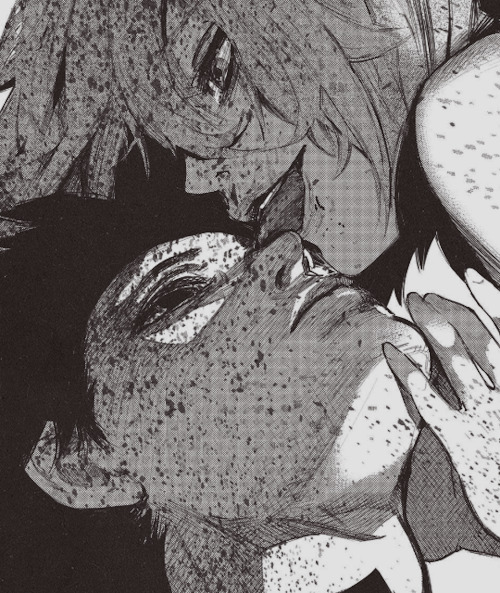
It’s my favorite Tokyo Ghoul ship? If you want to know my opinion of it, I did write a whole fanfiction on the ship. However, I can also explain my reasons for liking the ship with some character analysis. Basically, Kaneki and Eto are the same person. Kaneki loving Eto is him learning to reconcile the ugliest parts of himself. Falling in love with someone who’s just basically you in the mirror is a good way to learn some self esteem. Kaneki and Eto are the same because they’ve felt ostractized and unloved their entire lives due to having selfish and manipulative mothers, and uncaring or entirely absent fathers.
Their response to their total sense of isolation and status as outsiders is to write a story. They both have a narrative coping mechanism of the world, that’s why of all the characters they are the most highly associated with reading and books. It’s just they assign themselves different roles in the narrative. Kaneki is the protagonist of the tragedy, and Eto is the author of the tragedy. It doesn’t change the fact they see the whole world as one big tragedy. More under the cut.
1. The Protagonist of the Tragedy
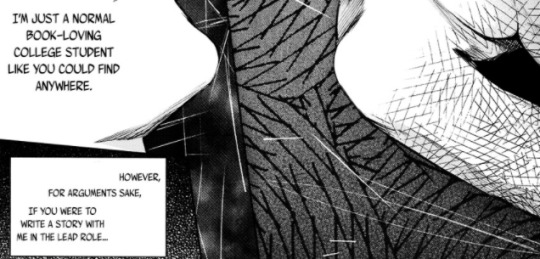
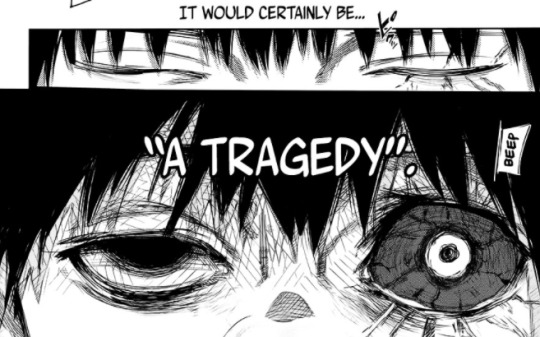
Kaneki’s coping mechanism has always been to imagine himself as the long suffering protagonist of the tragedy. His statement is twofold. “I’m not a protagonist or anything” and then “However if you were to write a story with me in the lead role it would certainly be a tragedy.”
This is paradoxical thinking. What Kaneki is saying essentially is that he is not a protagonist, but he is. The difference between a protagonist of say, a heroic epic, and the protagonist of a tragedy is that a tragic protagonist is ultimately helpless before their flaws.
Kaneki has always been outside of things. He is someone extremely isolated and lonely. He has difficulty connecting even to his lifelong best friend. Hide describes him as thus, he’s always pretending around other people and hiding his true self. Kaneki has this genuine fear of being well... genuine. He avoids emotional intimacy at any cost even though it’s the thing he craves the most.
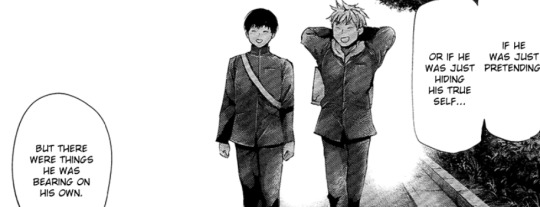
Which is why it’s easier for him to cope with things through a fictitious lens. He wants to be important to people, but he doesn’t really know how to be loved, so he always, always, always, chooses fighting for their sake instead. He plays pretend hero, pretend vigilante, and even pretend king depending on the circumstances. He is always, playing roles for the sake of others instead of trying to be his own self. He pretends to be a protagonist.
However, because of his abuse from his mother Kaneki is also unnaturally fixated on being a good person. He can’t bear to think he’s unkind, or cruel, or even violent like his mother was to him. He has such a strong, nauseous reaction to violence, he can’t even accept it within himself even when circumstances have dirven him to become violent.
So, rather than the protagonist he also wants to keep playing the victim. The victim is helpless. The victim is sympathetic. The victim isn’t to blame for their actions. Kaneki is afraid of being in control of his own actions, because he finds it hard to face himself and his own flaws and bear that responsibility. Kaneki’s coping mechanism is to feign helpelessness. To never truly make decisions because therefore he’s not responsible when he makes the wrong one.
It’s not just Kaneki who is coping poorly however. Whether or not he intends to his actions will always affect the people around him. Kaneki isn’t a protagonist, he’s merely pretending to be one. The problem with pretending to be a protagonist is that as a result you assign other people as supporting characters in your story, and forget that they have feelings outside of what you perceive their feelings to be.
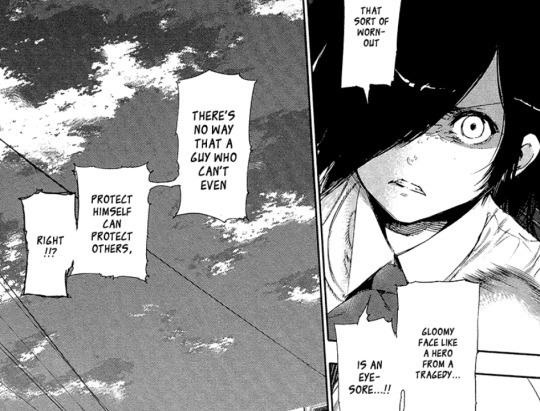
This is specificallly what Touka calls out in 120. She doesn’t want to be the heroine of his tragedy. She didn’t ask for him to protect her. Kaneki does all of these things without thinking or consulting her about her feelings at all and just assumes he knows best. Pretending you’re the protagonist gives you a self-centered view of the world. Kaneki can’t be with Touka at this point, because he can’t accept Touka’s feelings for him.

The most poweful sign of Eto and Kaneki’s connection ever is the fact that Eto has Kaneki completely read like an open book, without even really meeting him in person. It’s because they are in essence the same person. She understands Kaneki’s total sense of isolation because she’s lived it as well for her entire life.
Kaneki feels unloved and disconnected from others, and everything he does ultimately is in response to the lack of love he was shown as a child. That’s why Takatsuki’s lines, your parents failed in raising you. Echo so strongly for both of them.
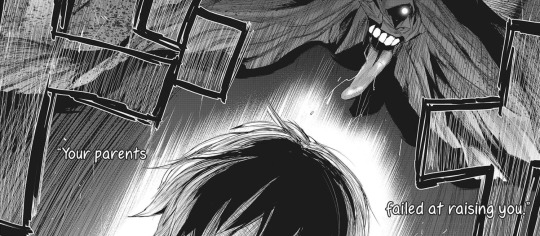
Now kiss you two.
2. The Author of the Tragedy
If Kaneki is someone who will feign helplessness, and avoid being in control of his own life then Eto is the opposite. Eto will pretend to be in control of everything because helplessness is what she fears the most. Eto was born outside of any framework or sense of stability for the world she can’t handle any of it. She longs to knock all of the structures down because they will always reject her and never include her, in the same way that Kaneki longs to be accepted by others.
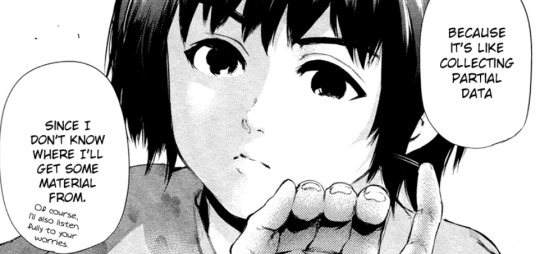
Eto reacts to the whole world like a book too, but she sees herself as the author in control of things. She’s the one writing the scenario. She chooses to bloody her own hands bcause it makes her feel in control of the violence that’s been inflicted upon her, her entire life. The things that Kaneki avoids because he’s afraid of being seen as a monster, Eto embraces willfully and becomes the monster. Eto, just like Kaneki sees everyone else as a fictional character. Whereas, Kaneki assigns them the role of support to his story, Eto sees herself as the author pitting all of the fictional characters against each other.
Kaneki lets himself be manipulated and Eto manipulates. Eto never sees herself as backed into a corner, or desperate. Everything is a planned move on her part. Everything is an intentional sacrifice. If she’s captured, it’s because she willfully walked into their plan and let herself be captured. She’s here because she wants to be. She pretends at all time that everyone is doing what she wants them to.
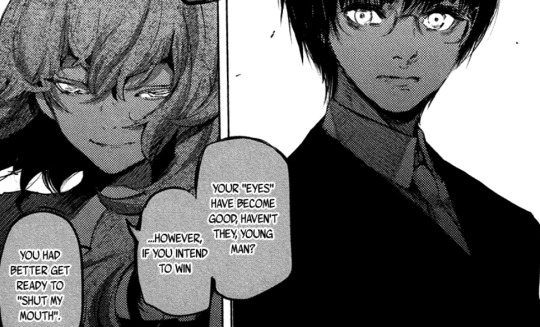
Even when captured and imprisoned in the cochlea, Eto intentionally walked in as a part of her big plan. The thing about Eto’s plans, and plans, and plans is that she’s bad at admitting when she’s losing or things are out of her control. Aogiri could never win an all out war against the CCG. Which is why Eto was too quick to burn Aogiri in a deliberate sacrifice to try to weaken the CCG as a part of her plan, rather than try to take her hands off and try a different approach.
The same way that Kaneki never wants to take control of his own life, Eto never wants to let go of her sense of control. Which is why she’ll pretend to be control even when she isn’t. Eto is just good enough at reading and manipulating people that she can delude herself into thinking that the situation is always in the palm of her hand when it’s not. Which is why things that are genuinely out of her control and impossible to predict have a tendency to explode in her face.
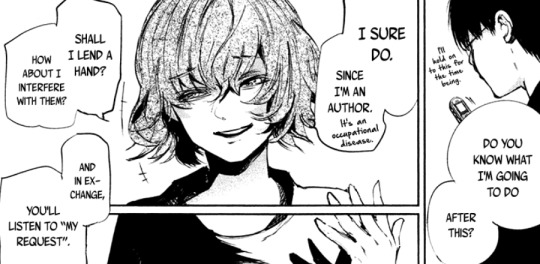
Even when Eto loses, she always sees it as a controlled lost. She wanted Kaneki to defeat her on the Tsukiyama Tower and devour her Kagune. She gave him that victory. She is still in control. She is always the author writing down the tragedy.
The key difference between both of them is that Eto externalizes, and Kaneki internalizes. Eto is trying to fix the world to make up for the inadequacy she sees inside of herself. Kaneki is trying to fix something in himself so people will find him lovable.
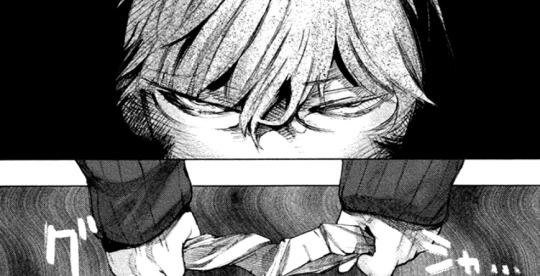

We see in Takatsuki’s flashback chapter that Eto’s resentment of Kuzen and his cowardice, has just as much to do with her desire to destroy V and as her wish for a better world. Kaneki and Eto’s trauma informs their actions just as much as their genuine desire to improve the world. They are wholly created by the traumatic circumstances that have affected them and been poorly coping all of their lives.
The best example to show them poorly coping with trauma is to show how they lash out. Kaneki and Eto are both children raised without any love, and they’ve come to two different conclusions. Kaneki sees himself as unlovable. That nobody is capable of loving him so he sees all relationships as a transaction and services rendered. Eto is the opposite, rather than an internal quality she focuses on an external one. She believes actual love doesn’t exist. That all love is selfish, just like her parents’ love for her ultimately was.
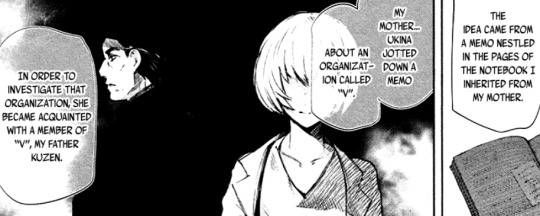
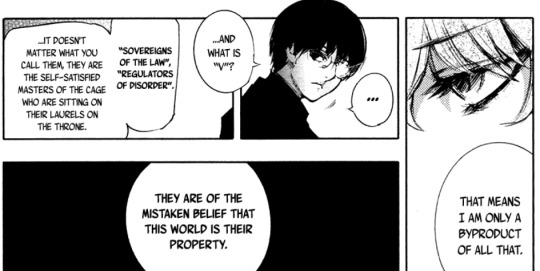
It’s shockingly different the way Eto and Kuzen tell the stories of her birth. Kuzen focuses on the love story aspect, as if Eto was genuinely the product of a love that bridged the gap between two different worlds. Eto believes that her mother was only using Kuzen and sleeping with him to get information, and that she was just an unplanned pregnancy. Eto is incapable of understanding her mother’s love for both her, and her father and chooses to believe no love exists at all. Kaneki on the other hand is incapable of understanding his mother’s contradictory love for him, and chooses to believe himself unlovable.
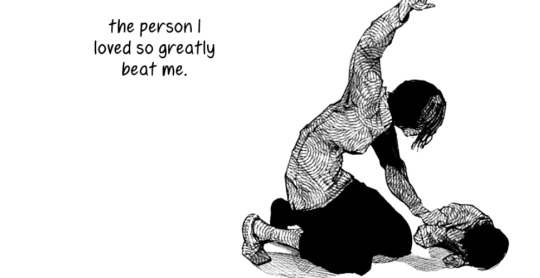

The person I loved so greatly beat me. I loved my mother, didn’t I?
Kaneki and Eto are hurt not because they don’t love their mothers, but they do. Their mothers are extremely important to both of them. Yet, neither mother seems to love them back. Ukina chose Kuzen over protecting her child. Kaneki’s mother chose her sister, and everyone else in the neighborhood to take care of while neglecting and outright beating her child when he asked for basic care. Eto does everything she does in Ukina’s memory to complete her mission, and Kaneki does everything to try to be the good boy his mother wanted him to be for a good portion of his life but neither of them feel loved by that mother figure. Kaneki and Eto were failed on the most basic level by the parents who were meant to be responsible for them and loved them and as a result they are continually coping with that lack of love.

The difference in their coping can be seen how they both treat Kanae. Kanae has an incredible amount in common for both of them. She lives seeking love, she has been orphaned and unloved and treated like an outsider in the Tsukiyama household her entire life even though they were supposed to take care of her as her direct family. She always had a close relationship with her mother before she died. She lives by pretending to be something she’s not in order to look stronger.
Eto’s response is to insist that Kanae’s love is selfish. That she’s an ugly, monster for trying to force her feelings upon Tsukiyama. Eto goes out of her way to try to prove that love is a lie.
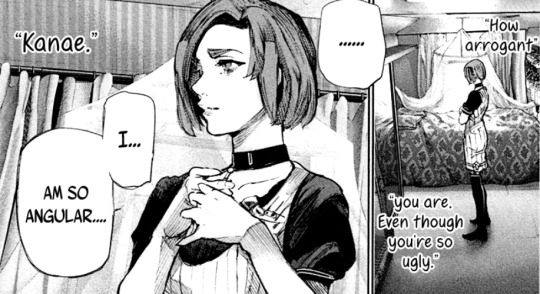
However, Kaneki much more passively also resents the hell out of Kanae. Kaneki’s wish to be loved is the same as Kanae. Kaneki will even become violent for the sake of that wish.
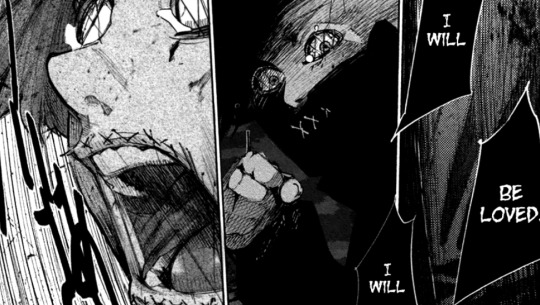
However, this is his response to Kanae at her lowest point.
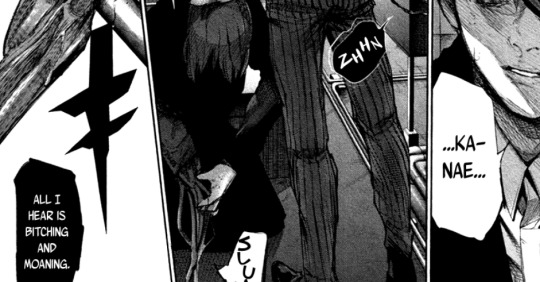

Kaneki’s choice to internalize all of his trauma inside of himself is one that also results in destruction. Remember that this is after Tsukiyama begged Kaneki for mercy on Kanae.
Kaneki’s habits of pretending to be helpless to avoid conflict, lead him into as much conflict as Eto gets into. The coping mechanism is different. The end result is the same. As Haise he spent the entire arc putting off conflict, but he ends up fighting Tsukiyama anyway, ends up brutalizing Kanae in the worst way possible, and even ignores Yoshimura’s wish to save Eto.
They cope very differently. Kaneki is always trying to change himself to suit the needs of other people. Eto is always trying to change other people to suit her own needs. However, the end result is the same. Kaneki’s seems more selfless. He’s letting himself suffer rather than make others suffer. He’s trying to hold it all in, rather than Eto who pushes all of it out. But, both are unhealthy. Eto wants to destroy the world, Kaneki wants to destroy himself.
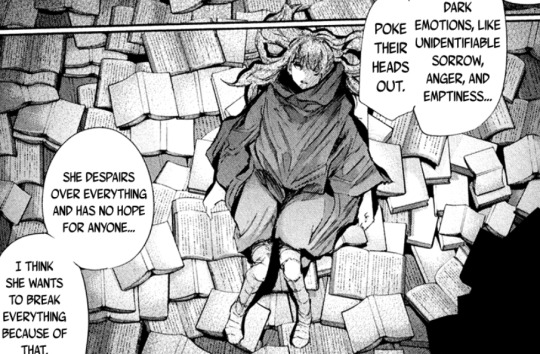
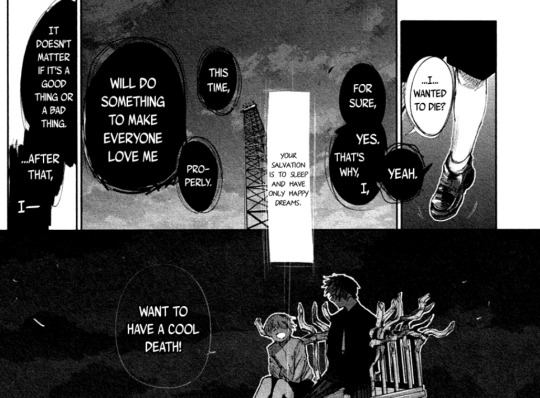
The result is still destruction regardless. Which is why the way Kaneki and Eto both treat Kanae is so important, they’ve both projected themselves onto Kanae, and want to destroy her because of it. They’re coping mechanisms which are meant to preserve them are instead self destructive. Which means ultimately they’re both terribly unhealthy people. The question of which one is good or bad doesn’t really have anything to do with it.
Kaneki and Eto’s relationship is so interesting because they’ve both been pushed to the point, where they’ve stopped hoping for things, and just want to destroy everything. It’s just what they choose to destroy is different, Kaneki wants to self destruct, and Eto wants to take the whole world down with her. That’s why I think they should work together to smash everything into tiny little pieces, and maybe kiss a little bit. There’s just something to be said about a relationship that’s built around learning to love the unhealthiest parts of yourself.
180 notes
·
View notes